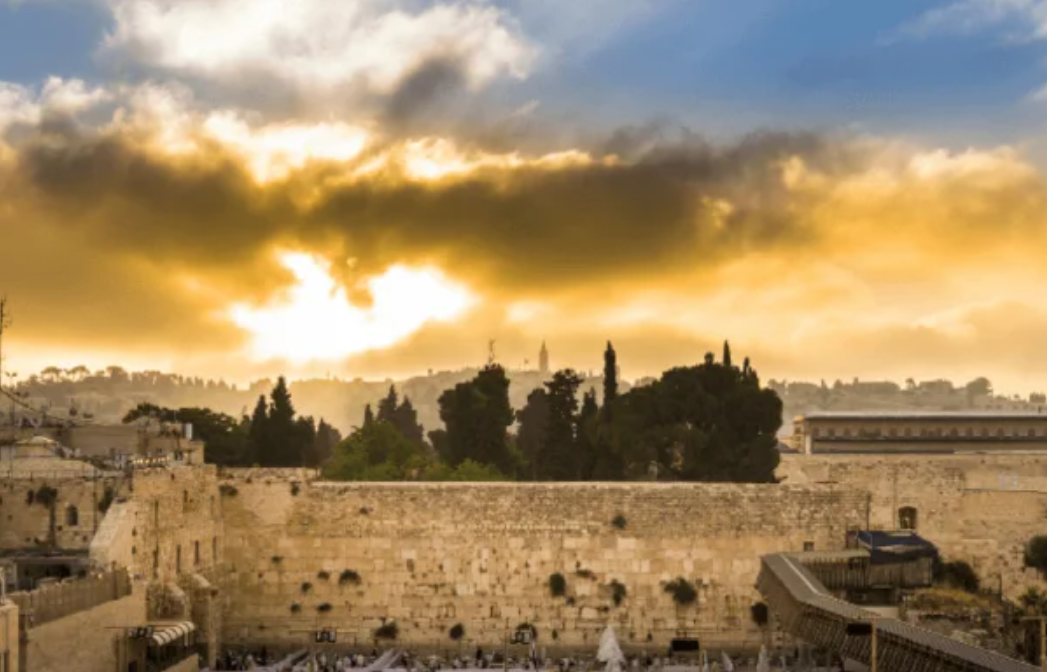
ECHOS FROM SINAI
Appearing as a weekly column in newspapers throughout Rural Georgia
By Rabbi Yonatan Hambourger & Tzali Reicher
Click on the button to subscribe and receive an update each week!
April 25, 2024

Jump Right In
By Yonatan Hambourger and Tzali Reicher
The crashing waves of the Red Sea scared the Jewish people. Freshly liberated after centuries of slavery, they couldn’t wrap their minds around what Moses was asking them to do as their Egyptian slave masters closed in on them from behind: to simply walk into the raging waters and let G-d do the rest. Sure, Moses had delivered on his promises to free them and performed miraculous miracles up to this point, but how could they risk their lives now, just like that?
The Jewish people passionately debated their options, until one leader took matters into his own hands. Nachshon, the bold leader of the tribe of Judah, confidently entered the choppy seas. The nation watched as the water reached his knees, naval and neck, with no apparent miracles occurring. And suddenly, as Nahshon’s head almost disappeared under the waves, the sea roared to life. Along with every body of water in the world, the Red Sea parted in two where Nachshon stood, miraculously drying the seabed for the Jewish people to march into freedom, escape Egypt forever and march to Mount Sinai, and eventually return to their homeland, Israel.
Passover famously begins with the Seder, this year on Monday night, April 22nd and Tuesday night, April 23rd, where Jewish families the world over gather together for a 12 part meal and remembrance of their ancestors' exodus and deliverance from Egypt, which was a formative element in the founding story of the Jewish people.
Not as well-known as the beginning of the holiday are the last two days of Passover (Monday, April 29th, and Tuesday, April 30th), where we mark the conclusion of the weeklong festival, and commemorate the splitting of the Red Sea, when G-d performed unprecedented miracles that transcended the laws of nature. The celebration includes actively remembering what G-d did for the ancient Israelites by staying up the whole night to learn Torah, and having meals celebrating the Israelites deliverance then, as well as the Messianic deliverance all of humanity will experience, speedily in our days.
But there are many miracles G-d performed in the Bible which don’t include celebrations millennia later. Why is the miracle of the Red Sea still applicable in our times, that it warrants such commemoration?
There’s an enduring message about faith that resonates even after many centuries from the miraculous events of the splitting of the Red Sea.
Despite witnessing G-d’s miracles clearly for all to see, still the Jewish people weren’t sure whether they should listen to His directives and walk into the sea. G-d had stood by them and proven Himself, and still they waffled. Yet one brave man took it upon himself to set the tone for the entire nation and triggered the chain of events that ushered in the miracle of the splitting of the sea, their enemies vanquished, and the road to redemption and to Mount Sinai open up.
These days, it’s easy to miss the miracles we experience every day. With wars raging around the world and domestic concerns at home, we can miss the everyday things we take for granted and never feel grateful for. While we see miracles happening around us, the incredible failure of Iran’s attack on Israel and U.S. regional interests, being a notably recent one, miracles can seem few and far between, leaving room for doubt and despair to creep in and fill that void, leaving us to question G-d’s plan for us and doubt whether we should follow His directives at all.
At these times, it’s important to remember that G-d is always with us and has always been there. Every gift we have, be it our family, our job, or even the gift of being born a free American, is a miracle that we have been blessed with. When we experience moments of doubt, like Nachshon who jumped into the Red Sea, we need to push away the fear, and trust what we know is right, trusting G-d to be there for us like He always has been.
As always, we’d love to hear your thoughts on this subject, or any other. You can reach us at y@tasteoftorah.org.
Yonatan Hambourger is a rabbi with Chabad of Rural Georgia. Tzali Reicher is a rabbi and writer based in Florida.
April 18, 2024
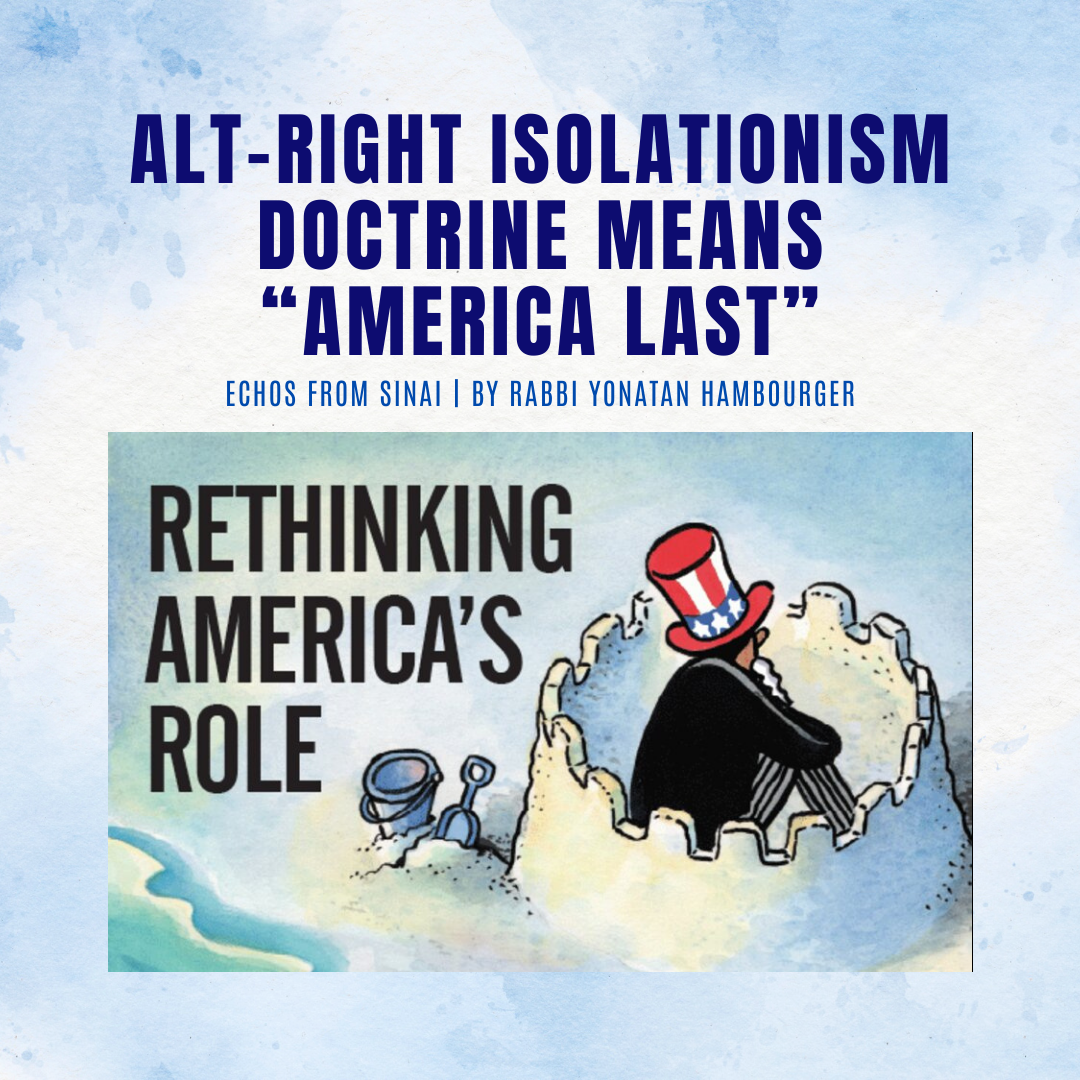
Alt-Right Isolationism Doctrine Means “America Last”
By Yonatan Hambourger and Tzali Reicher
Most Americans, regardless of party affiliation, agree that the United States should not be exporting its products for free while American taxpayers pay heavy tariffs on products coming from those same countries. Further, most Americans agree that we should not be funding everyone else’s militaries and alliances if those very countries will not invest in their own annual budget for their own protection.
This understanding reflects how the vast majority of Americans feel and how successive administrations have run U.S. foreign policy, albeit with differences in emphasis and rhetoric.
Until October 7.
Only days after Hamas perpetuated its massacres, rapes, and kidnappings of 1,300 innocent Israeli civilians--and long before Israel launched its response-- a handful of commentators began questioning the United States’ support for its only democratic ally in the region, framing their position with an isolationist fervor. Their argument can be framed as an “either/or” proposition such as, “the same money given to Israel on account of the Jewish lobby, could be used to solve the fentanyl crisis. That’s killing tens of thousands of our children.”
It’s dishonest, and plainly wrong.
Even if we were to believe that those that hold this position aren’t antisemitic or specifically anti-Israel, applying this understanding would mean that the United States should retreat from the world stage, clearly an America-Last policy. This would hasten the end of the world as we know it; the world we’ve been at the forefront of for almost a century.
If we were to abandon our alliances and agreements, the world would quickly descend into anarchy and chaos. In Asia, China would make its long-anticipated move to invade Taiwan after years of fearing American pushback, blocking American access to semiconductors and chips, essentially locking the United States out of competing for the future. With no threat of American and NATO interference, Russia would continue its march across Europe in Putin’s bid to rebuild a Russian empire, threatening every country on the continent. And in the Middle East, with “Big Satan” out of the picture, Iran would push its proxies to join with Israel’s enemies in the region in yet another bid to wipe the only Jewish state off the map. With America in isolation and left with no influence on the world stage, there will be more world wars, higher costs, and a completely destabilized world that would inevitably force the United States into conflict with a tremendous loss of life, an obvious and completely avoidable result.
Instead, American policy should continue to harness our leverage and influence to achieve better results for the stability of the world, which benefits every single American. By having allies with commonly shared values in every corner of the world, we are able to influence those areas, no matter how far away they are. By supporting Taiwan, we are ensuring China can’t dominate the world and dictate our markets and futures. In backing Ukraine, the United States is doing its part to ensure the world order and peaceful consensus that came out of WWII, without losing a single American life. And by standing with Israel, we have the opportunity to support a fight against evil that wishes to destroy the United States and Israel equally.
For this reason, due to Israel’s role in combating terrorism which obviously serves the United States’ interest, there is a school of thought that suggests money allocated to Israel should be included in the military budget, not the foreign aid handouts that the United States distributes to countries that we get nothing in return from. President Ronald Reagan’s Secretary of State Alexander Haig phrased it best when he said, “Israel is the largest American aircraft carrier in the world that cannot be sunk, does not carry even one American soldier, and is located in a critical region for American national security.” Israel fights in the trenches against our common enemies so that we don’t have to send our soldiers to war; all they need is our support.
But mostly the United States must stand with Israel in this battle because it’s the right thing to do, and doing the right thing is the American way. We don’t step back and pretend to absolve ourselves of problems around the world by putting on blinders. We stand with and support our allies and defend our vision of the world that we shaped, for the good of all humanity. This is the real meaning of America’s righteousness, no matter the lies and deceipt that con-men, con-women, and opportunists peddle online for clicks, while peddling their ill-conceived and destructive agenda.
Yonatan Hambourger is a rabbi with Chabad of Rural Georgia. Tzali Reicher is a rabbi and writer based in Florida,
April 11, 2024
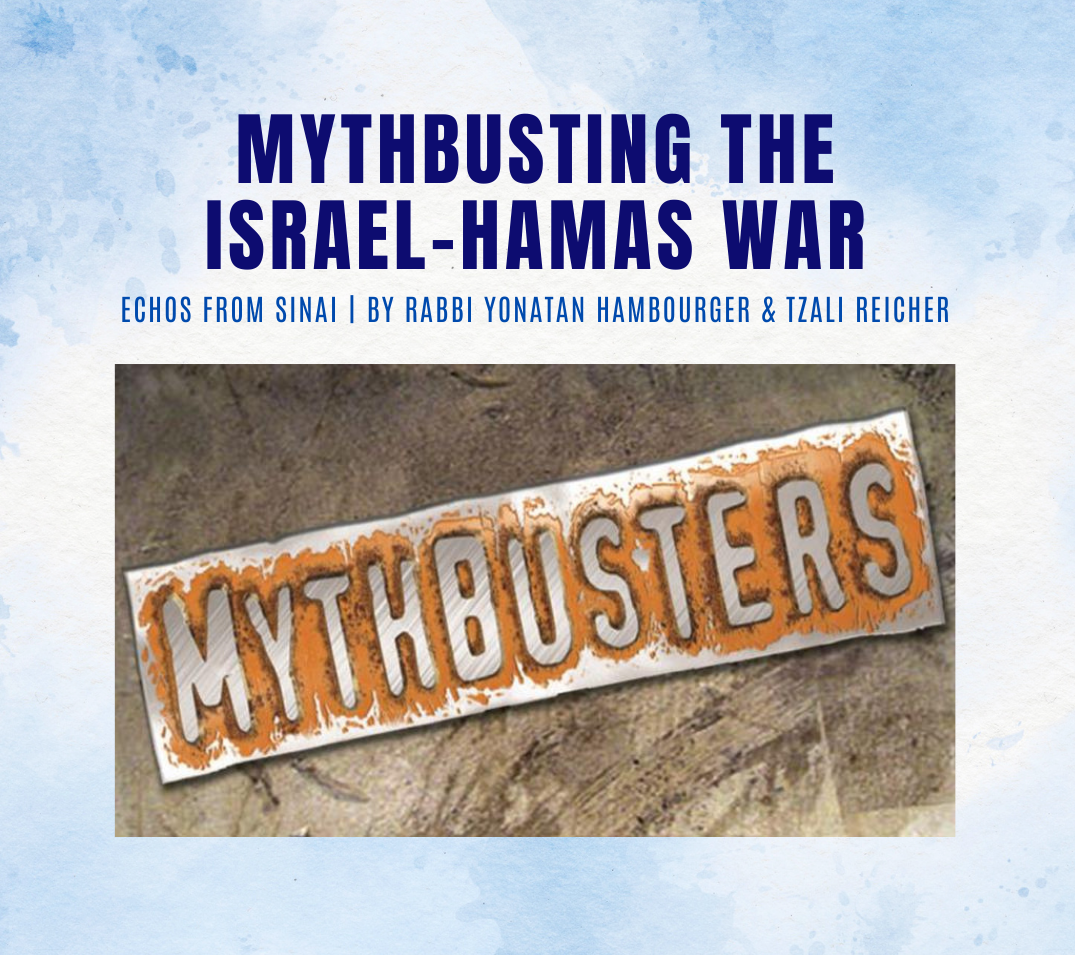
Mythbusting the Israel-Hamas War
By Yonatan Hambourger and Tzali Reicher
Myth 1: Israel exists on the land of the State of Palestine.
There has never been an independent state of Palestine that the Jewish people usurped.
Israel, the scientifically and biblically undisputed ancestral homeland of the Jewish people until their violent exile 2,000 years ago, was occupied by the Ottomans and British for 500 years before the re-establishment of the State of Israel in 1948. During this time the land was continually inhabited by indigenous Jews who weren’t exiled, and various disjointed clans of Arabs hailing originally from Egypt and Transjordan, who never claimed any state-like ownership or historical relationship to the land.
Once Israel agreed to the United Nations partition plan of 1947 and accepted a sliver of their ancient land for a state, five neighboring Arab countries launched a war one day after Israel’s rebirth in May of 1948. Miraculously, Israel won the battle, but lost East Jerusalem, the West Bank and Gaza to the marauding invaders for the ensuing 19 years.
For those nearly two decades under Jordanian and Egyptian control, there were no calls for an independent state of Palestine in the region, yet as soon as Israel regained access to the historically Jewish areas during the Six-Day War of 1967, the cause of Palestinian nationalism was reborn, with the genocidal rallying cry “from the (Jordan) river to the (Mediterranean) sea, Palestine will be free;” in other words, no Israel anywhere.
Despite all the disinformation spread in the five decades since, there has never been a State of Palestine with any government or history on the land of Israel. Instead, the history of Palestine is a legacy of the ancient and brutal colonization Roman perpetuated on Israel millennia ago, that has been misappropriated by many who wish to do the same today.
Myth 2: Israel is an apartheid state.
Israel is a democratic country with Palestinian and Israeli-Arab members of parliament, Arab justices on the Supreme Court, a judicial system that charges those convicted of crimes regardless of faith or station, and the high quality of life and income for all Arabs (especially when compared to neighboring countries). Israel cannot be called an apartheid state. Those who do because of the measures Israel is forced to employ to protect its civilians from terrorist activity are peddling misinformation, and a disservice to those that truly suffered under real apartheid regimes.
Myth 3: Israel occupies Gaza.
There is no territorial dispute between Gaza and Israel and the borders are recognized by the U.N. Israel unilaterally and completely withdrew not only its military presence from Gaza in 2005, but the thousands of Jewish people that lived there as well, to give the Palestinians the opportunity to self-govern and grow a society for themselves. But the citizens of Gaza promptly elected Hamas which proceeded to embed tens of thousands of missile launching pads and military installations within highly concentrated urban areas and cynically used its own citizens as human shields for thousands of rockets and terror attacks into Israel for the next 18 years.
October 7 proved why Israel needs to maintain air and maritime control of Gaza, to ensure even more weapons and tools to attack Israel aren’t smuggled into the trigger-happy arms of Hamas. But even as Israel faces calls that this is still an occupation (it's not), no one bothers to call out or expect any assistance from Egypt, who maintains a much more hardline stance against the Palestinian people along their own shared border.
Myth 4: Gaza is the most densely populated area on Earth, and an open-air concentration camp.
Encouraged by extremist leaders and facilitated by massive United Nations funding, millions of Palestinians have been incentivized to adopt refugee status, and live in overcrowded but permanent cities, mischaracterized as “refugee camps.”
Many generations live with each other, partly because of the density, but also for cultural reasons, while the wide boulevards, plentiful groceries, high-end luxury stores, and beautiful beach resorts that filled Gaza pre-war disprove the notion that Gaza was ever anything remotely comparable to a concentration camp.
Additionally, Palestinians have an average life expectancy of 75 years, tenth out of 22 Arab countries, with the third lowest infant mortality rate in the Arab world, highlighting its high level of health care. Palestine was named the third happiest Arab country and the 30th happiest in the world in a recent survey and is one of the largest recipients of international aid in the world. All this data significantly undermines the shallow and uninformed talking points many employ when discussing this conflict.
Myth 5: Israel is withholding aid, starving Gaza, and indiscriminately bombing civilians.
Never has any country in history, when defending its land after an invasion and massacre, provided its enemy's population with food and resources. Never before has a country routinely worked and engaged with a hostile enemy, warning them where they were going to attack and when, to ensure minimal civilian harm.
Hundreds of trucks flood into Gaza every day, supplying food and aid to a population that participated in Hamas’s brutal assault in Israel, all facilitated by the very same country they attacked. While claiming for months that famine is looming, the price of food in Gaza has dropped faster than a rock, as supply far outpaces demand. Israel has lost over 500 soldiers in this war, as they proceed house by house in Gaza to eliminate Hamas terrorists, rather than indiscriminately harnessing its world leading air force to strike Hamas without any danger to Israeli lives.
Feel free to share any misconceptions you’ve heard about Israel, Palestine, and the ongoing war, and we’ll look to address those in upcoming weeks! You can reach us at y@tasteoftorah.org. We love your feedback!
Yonatan Hambourger is a rabbi with Chabad of Georgia. Tzali Reicher is a rabbi and writer currently based in Florida.
April 4, 2024

The Projection of Pain is Propaganda
By Yonatan Hambourger and Tzali Reicher
As Israel’s effort to uproot the Hamas terror organization, an Iranian proxy, from Gaza continues into its sixth month, the battle for public and world opinion rages online and in the media, with both sides vying for the moral high ground and international support.
For the most part, Hamas’s plan to paint Israel as an indiscriminate aggressor seems to be working, most recently aided by the tragic incident during which a number of international humanitarian aid workers were killed. Despite Hamas’s repeated rejection of negotiated ceasefires and mutually agreeable solutions that Israel agrees to, still Israel is facing condemnation and calls to bend over backwards to accommodate the whims of an irrational terrorist death cult that still holds hundreds of innocent hostages.
Despite facing a mountain of pressure, Israel remains undeterred. While the current administration of the United States waffles in its public support of our most dependable ally in the region because of domestic political concerns, there is broad consensus in Israel of what needs to happen next. An operation in Rafah-Hamas’s last stronghold-will take place, in order to get rid of the genocidal threat on the borders in a way that no diplomatic solution can accomplish, and seek to rescue the hostages, including several American citizens. Israel will inevitably face backlash from countries inexplicably sympathetic to Hamas terrorists, yet it is a burden Israel will work through because sometimes, the right thing to do remains the right thing to do, despite what all the people who have morally twisted their thinking to the opposite position yell and scream.
However, there is one charge that cuts Israel, and by extension world Jewry, more than any other: the claim that Israel is committing genocide and ‘a Holocaust’ on Palestinians.
Living in the modern world that we live in, when we can viscerally experience war on our phones from the comfort of our own homes thousands of miles away, reasonable people witnessing what is happening in Gaza because of Hamas’s homicidal use of human shields and civilian infrastructure are deeply affected by the graphic images they see on their screens and baselessly, carelessly and, most importantly, harmfully, express their outrage by throwing around terms and historical comparisons that do not make sense and are belied by the evidence.
The genocide and Holocaust comparisons have been made by many public figures and online commentators, including the generally interesting Joe Rogan, who called Israel’s war in Gaza a small scale Holocaust on a recent podcast episode, and more pernicious actors like the antisemitic UN Special Rapporteur (Appointee) on Occupied Palestinian Territories Francesca Albanese, who issued a report titled “Anatomy of a Genocide,” concluding that there are “reasonable grounds to believe” that the threshold indicating the commission of the crime of genocide has been met.
There has been one Holocaust in history and is the one that Germany perpetrated on the Jewish people just 79 years ago. There have been many genocides and massacres in history, most notably and recently in Rwanda, Sudan, and the Uyghurs in China. When compared to actual historical equivalents, Israel’s current operation against Hamas is self-evidently not a genocidal campaign, but a tragic necessary and defensive war, that many do not understand because of the peaceful and prosperous society we’ve been blessed to live for the past seven decades, guaranteed by the valiant and brave efforts of the Allies who fought to defend those right in World War II.
Those offended at the images of the war or those who are already predisposed to think about Israel negatively ignore all the evidence of Israel’s historically unprecedented work to minimize civilian casualties (recognizing tragic and deeply regrettable accidents have happened in the fog of war) and target only the terrorist actors destabilizing the region.
Those who perpetrate genocides systematically work to wipe out civilian populations, like the Khmer Rouge regime led by Pol Pot committed against the Cambodian people. They disappear millions of innocent men, women, and children, like Stalin’s Russia and Xi’s treatment of the Uyghurs. They seek to starve their victims of food and resources and break them down through terror with indiscriminate attacks. Quite clearly, Israel has done none of that: Israel’s incredible civilian to terrorist target ratio-despite the dense environment they have been forced to operate in-has set a new standard for urban warfare, that no other country has come close to living up to. Israel’s legal system ensures those convicted of terror related offenses are imprisoned, and even get to benefit from all prison services (including Yahya Sinwar, who was educated and had lifesaving medical treatment in an Israeli jail), while the majority of Palestinians and Israeli Arabs live in peace. And for a country supposedly seeking out to erase a people, Israel has been surprisingly diligent in its efforts to inform the population where it is attacking and when, even sharing escape routes and aid, to avoid unnecessarily harming civilians, for the first time in the history of modern warfare.
Instead, those smearing Israel with these horrific charges are misinformed and falling for propaganda, or purposefully spreading misinformation. When asked for proof for her contention that Israel is committing genocide on the Palestinian people, Albanese arrogantly and sarcastically retorted that no evil government ever writes down their strategy to explain why there is no proof how Israel’s war meets her absurd contention, ignoring actual genocidal regimes that did have a paper record laying out their horrific intent (see the Wannsee Conference).
Hijacking the Jewish people’s tragic history and experiences and misappropriating it for those who dream of perpetrating yet another genocide against the Jews is deeply hurtful and offensive. It is a way for those that seek to tar Israel to redirect blame from the perpetrators of the October 7 massacres, rapes, and kidnappings, onto a people they hate for one simple reason: the fact they are Jews. It is a deliberate and calculated attempt to dehumanize and delegitimize the Jewish experience, turning victims into aggressors through a dangerous and manipulative narrative, and too many are falling for it and spreading it further. By doing so, these individuals not only insult the memory of the actual victims of genocide by tying them in with bloodthirsty terrorists but cheapen and strip a powerful word and historical events of meaning and significance.
In this battle of good versus evil, all the information and supporting evidence of the party in the right and the party in the wrong is available for all to see. It’s incumbent on us to inform ourselves of the facts before commenting about a conflict thousands of miles away, that is felt deeply by those here at home.
Yonatan Hambourger is a rabbi with Chabad of Rural Georgia. Tzali Reicher is a rabbi and writer currently living in Florida.
March 28, 2024
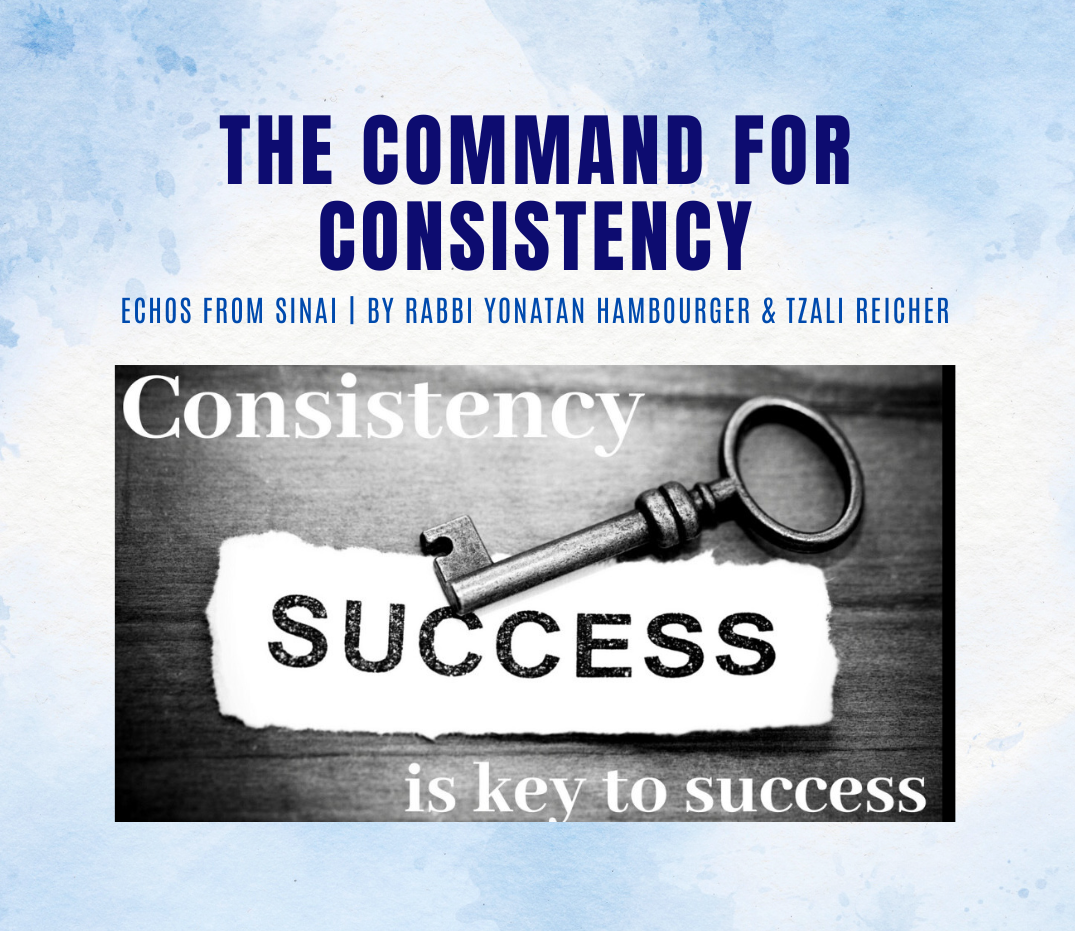
The Command for Consistency
By Yonatan Hambourger and Tzali Reicher
There is a common misconception about the Old Testament that is worth debunking.
Conventional wisdom and people with only a surface knowledge of scripture tend to fall on shallow adjectives when attempting to describe G-d as portrayed in the Hebrew scriptures, describing the Lord as dark, vengeful, and vindictive, and constantly clashing with the Jewish people. But aside from being objectively incorrect, this synopsis doesn’t capture the undying love, connection and warmth G-d is explicitly said to have for His people.
That is why it is so jarring to read the opening verses of this week’s Torah portion (Leviticus 6.2), where G-d tells Moses to “command” the priests to offer the twice-daily sacrifices in the Tabernacle. When introducing a mitzvah (commandment), typically the verse uses the words “speak”, “say”, or “tell’ the Jewish people about what G-d wishes for them to do, using considerably softer language than the infrequently invoked “command”. Rashi, the most prominent commentator of the Torah, goes on to explain that the word “command” is used here because this mitzvah must be performed daily, and therefore needed extra emphasis from G-d to encourage the people to perform it regularly and to signal its importance.
When there is a unique and exciting opportunity to do a good thing, it’s easy to summon the energy to perform it with little instruction. It’s easy to go to our places of worship once a year on special occasions, donate our time or money irregularly, and visit our elderly relatives briefly when we just happen to be in town. Doing the right thing is harder when it’s expected to be done regularly. Indeed, it is difficult to commit to attending daily or weekly opportunities to connect to G-d together in community, setting auto-payments to charities and devoting weekly times to volunteer and spend time with people who could really use the company.
That is why G-d places the emphasis of a divine ‘command’ on a regular practice, instead of on the unique services of different holidays or the like: We must be careful to not let our regular acts of service become rote and robotic, Instead, we should enliven these actions, imbuing them with the vibrancy and enthusiasm we typically sum up for special occasions, because G-d seeks to foster a relationship with us through consistent expressions of engagement. This is reinforced by the seemingly regular mitzvah G-d is commanding the Jewish people to perform here: Placing a sacrifice on the fire that should burn constantly. Fire signals passion and excitement, which is how we need to approach even every day, mundane events, and good deeds.
In understanding the depth of the "command" for consistency in our daily observances and actions, it becomes evident that this principle extends far beyond religious rites to encompass the very essence of our daily lives. The practice of turning the mundane into moments of significance teaches us the power of transformation - the ability to elevate our routine tasks, interactions, and commitments to a level where they become sources of joy, growth, and profound connection. This lesson from the Torah portion is not just about religious observance but about how we approach every aspect of our existence, turning the ordinary into extraordinary through consistent effort and dedication.
This is true of relationships between people, and in the realm of working to build good habits. If a couple only discusses their relationship or show each other appreciation or affection on birthdays and anniversaries, they will drift apart. If someone working towards succeeding in their chosen profession only puts in the hours sparingly, failure is inevitable. Only by putting all of ourselves in everything we do, truly applying ourselves to make every day fresh and exciting, will we be able to thrive in whatever we drive ourselves to achieve.
G-d is teaching us an important lesson when He commanded the priests to perform a seemingly easy and frequent act of service with excitement. Consistently doing good deeds and everyday acts of kindness with passion becomes a powerful tool for personal and communal transformation, guiding us towards a deeper, more meaningful engagement with our faith, our relationships, and the world at large. It is in the faithful execution of our positive daily duties and responsibilities that we find the true expression of our highest and best selves and the fullest realization of our potential to succeed and make a difference.
Yonatan Hambourger is a rabbi with Chabad of Rural Georgia. Tzali Reicher is a rabbi and writer based in Florida.
March 21, 2024
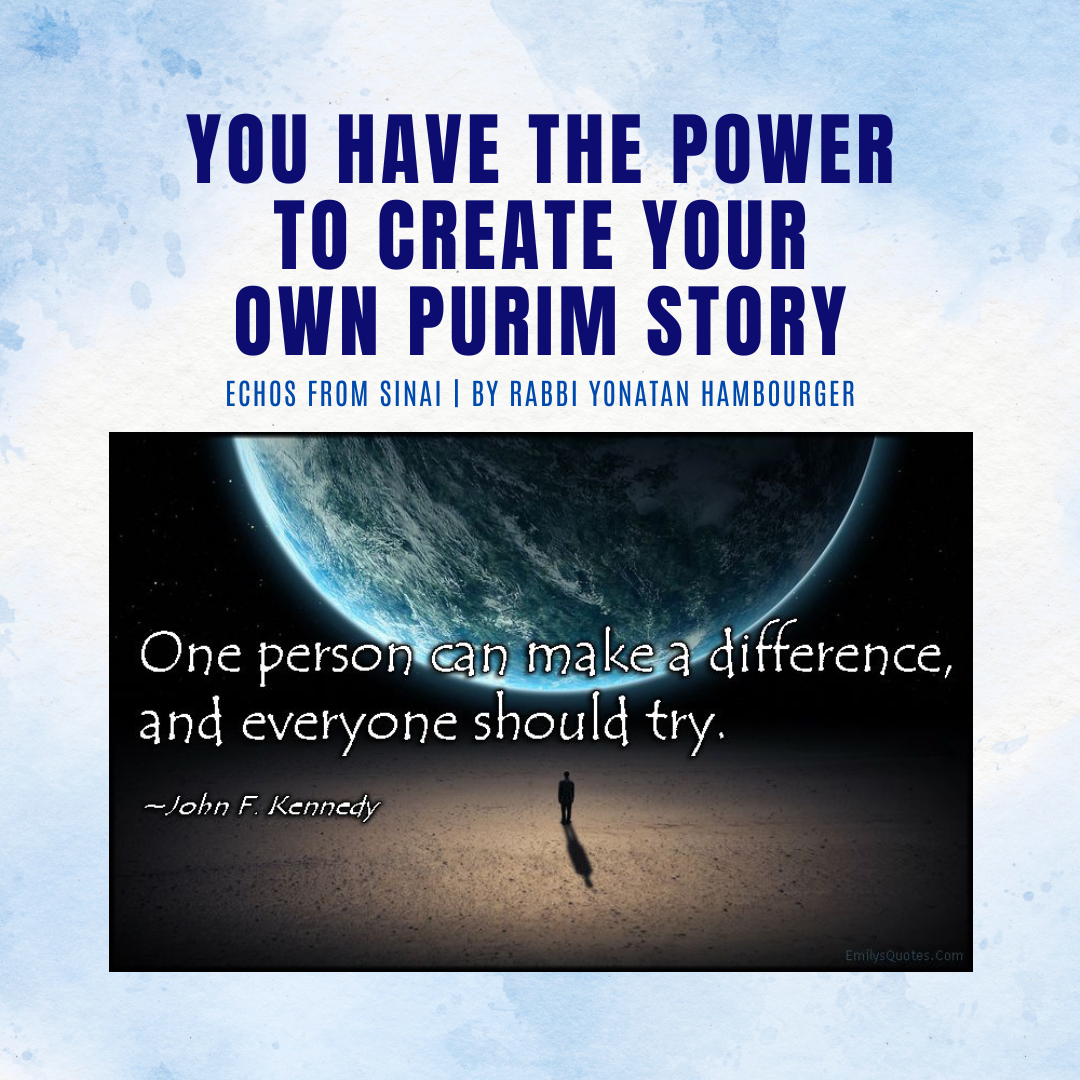
You Have the Power to Create Your Own Purim Story
By Yonatan Hambourger and Tzali Reicher
Purim, the Jewish holiday celebrated this year from Saturday evening till sundown Sunday, is unique in its emphasis on joy.
Indeed, while the Torah instructs us to be joyful during several festivals, none have the same level of emphasis as those commandments (mitzvahs) and rituals expressly instituted for this purpose as does Purim. There is the command to read the story of the original Purim, when Mordechai and Queen Esther saved the Jewish people from total extermination at the hands of the evil vice chancellor Haman and the bumbling King Ahasuerus, to demonstrate how G-d delivered the Jewish people from their enemies then and now. There is the custom to have a joyous meal with wine, revelry and dress up in costumes, and a focus on sharing gifts and charity with friends and those less fortunate to ensure they too can celebrate the festival with the same joy.
At face value, the reason for such celebrations is obvious. Just under seven decades after destruction of the First Temple and forced exile from their homeland of Israel, the Jewish people once again faced destruction by a people driven by an irrational hatred towards them and were miraculously saved in an incredible series of events.
Of course, that is worth celebrating, and there are many lessons from this story that can be applied nowadays. There is the fact that Jews are being persecuted and scapegoated around the world amidst a historic rise in antisemitism, yet like Mordechai and the Jewish people of his day, we remain proud and unbowed. Like Haman’s opportunistic followers in Ancient Persia, just several months ago (and many times in preceding decades and centuries) a people rose up seeking to destroy and kill as many Jews as they possibly could, yet Israel is fighting back and slowly rebuilding, their spirit intact and alive.
But perhaps an understated lesson of Purim is one that is universal in its application, and a reason we can all celebrate and use as fuel to inspire us all. The Book of Esther, wherein the story of Purim is told, is exceptionally detailed and narrative oriented, far more than any other book in the Old Testament. When reading it, one finds themselves in the corridors of power and great dining halls in the court of the king. The reader feels Mordechai’s anguish and witnesses his attempts to save the Jewish people. We are inside Haman’s family home as he schemes and plots, and we are a fly on the wall when he finally gets his comeuppance as Queen Esther reveals her Jewish identity to the king and tells him ofHaman’s machinations.
Throughout it all, we see the courage of the individual standing up and jostling to affect change, both for better and for worse.
The king starts off as an antagonist of the Jewish people, throwing a party to celebrate the destruction of the Holy Temple and the Jewish kingdom in Israel, and ends up as an ally who ultimately helps the Jewish people return to Israel facilitating the rebirth of the Jewish Kingdom, and the rebuilding of the Second Holy Temple in Jerusalem. Haman, the brilliant and twisted advisor to the king, is single handedly able to subvert policy to legally purge the Jewish people from the king’s global empire, only to be foiled by the relentless efforts of Mordechai and Queen Esther, who has tremendous courage and self-sacrifice to enter the lions’ den and reveal her true identity, at the risk of infuriating the king and endangering her life.
None of these people let themselves be dictated by the status quo; they all embraced their individual agency and power to change what others would have assumed was a foregone conclusion and beyond their capability to change or affect. Haman used that power for evil, while Mordechai and Queen Esther embraced it for good, and are celebrated for that till this day.
Today, at a time when more and more people feel powerless and caught up in the rat race with nopower and agency, Purim reminds us that we each have the ability to take control and break the myth of status-quo. Our identities are not as political pawns for politicians or as worker bees for faceless corporations, rather we are valuable members of our communities and families who have so much to contribute to enhance society. There is no time like the present to stop scrolling on social media about what everyone else is doing and self-actualize the change you want for yourself. Whether that’s by beginning a family, turning that side gig into a business, or volunteering your time to help your community- grab the G-d given opportunities and talents you have been blessed with and manifest them into reality.
It’s been a proven formula for success, from the times of the Purim story to the founding of our great nation, and up to this very day: individuals make a difference and have the power to change history. You are that individual, and that is worth celebrating.
Yonatan Hambourger is a rabbi with Chabad of Rural Georgia. Tzali Reicher is a rabbi andwriter currently living in Florida.
March 14, 2023

What A Palestinian State Will Look Like
By Yonatan Hambourger
As the war between Israel and Hamas continues into its sixth month and many around the world are looking to find a way to put it to an end, the chatter around recognizing a Palestinian state as an exit ramp is getting louder and louder. News outlets in the United States and the United Kingdom, traditionally seen as Israel's staunchest allies, have discussed supposed plans in their respective State Departments to push forward with timelines and announcements for establishing a state for the Palestinian people, much to Israel’s chagrin and consternation.
The case of those that call for a Palestinian state is obvious: Give the people a state to call their own, along with the dignity to control their own security and civil administration, and peace will be upon the land. It is Israel’s reasons for opposing this that are completely unrepresented (or when addressed, misrepresented) by government and media types.
For starters, the founding story of a country significantly shapes its culture and identity for generations. In the United States, the timeless story of the courageous Founding Fathers rebelling against a distant imperial monarchy to establish a democracy for the people by the people resonates deeply and is often celebrated. Similarly, Israel's origin story is the story of a decimated Jewish people rising from the devastating genocide of six million of their people and returning to their ancient homeland after 2,000 years of continuous colonial rule. In both cases, there are heroic and admirable arcs and protagonists that are worthy of being celebrated as the patriarchs of our nations.
For a Palestinian state, rewarding its history of fanaticism and terrorism would be shameful, and the lessons and incentives it teaches are perverse. If the world were to recognize a state now, it would be as a direct result and reward of the brutal assault Hamas unleashed on Israel on October 7th, where they raped, kidnapped, looted, and murdered their way into a war they couldn’t win, and then rewarding their terrorism with an outcome beyond their expectations. October 7th, the worst single day in Jewish history since the Holocaust, would be celebrated as Independence Day, and its terrorist perpetrators would be forever honored as the nascent state’s Founding Fathers. Civilized societies can’t allow a state to be born through terrorism and expect to be rewarded with a friendly and peaceful country in return, with a healthy culture and admirable heroes.
Then there are Israel's security concerns to consider. There is no evidence to suggest a recognized Palestinian state wouldn’t turn into what Gaza became after Israel withdrew its entire civilian population and armed forces in 2005: a vassal state for enemy regimes and launching pad for thousands of rocket and terrorist attacks that have killed thousands of Israeli civilians over the decades. The only reason more civilians haven’t been harmed, that would have forced Israel into this war much earlier, is because of the miracle of Israel’s Iron Dome system.
The balance of world security would also be affected by recognizing a Palestinian state. There seems to be an assumption that a new Palestinian state would be allied with the United States and our interests, united in the common causes of freedom and democracy, but there’s no reason to believe that is true. Sure, the Palestinians talk to us because the United States is the most powerful country in the world and gives Palestinians plenty of money for their indulgence, but their culture is much more in line with that of Russia, China and Iran. What’s not to say that as soon as they’re handed a state, they won’t sign security agreements with these belligerent and aggressive countries, who will threaten World War III when Israel is inevitably forced to respond to terrorism?
And finally, there is the question of who will run this state. The United States accepts Israel’s demands that Hamas must be dismantled, but our government’s favored party to lead the new country is the Palestinian Authority, who is already making noises about simply folding Hamas into their organization and claiming it has been eradicated. PA President Mahmoud Abbas, now a frail 90-year-old authoritarian in the 21st year of what was supposed to be a 4-year term, is already just a dictatorial figurehead, and it's reasonable to expect a Palestinian state would adopt the model of its patron states, where the real power is in the hands of a mysterious council who rule by fiat. There are no Arab democracies in the world; there is no reason to think Palestine would be the first, just because we want it to be so. Despite utopian hopes and pronouncements, a Palestinian state would not be a thriving liberal democracy with a religious bent in a vein similar to Israel. It would continue to be Judenrein while subjugating and intimidating its Christian minority, and a repressive authoritarian theocracy that aggressively punishes those that don't follow their twisted version of Islam.
In reality, it’s much more likely that the situation on the ground would remain exactly the same: the ‘government’ will continue to be led by extremists and fanatics who remain in power despite overt corruption and stealing foreign aid money, while Israel is expected to continue providing essential services for the population or risk international condemnation. The United Nations would continue operating in the area with a massive budget donated by kind countries, as the leaders continue getting fat from their people’s pain.
Knowing all this, we can confidently say now is not the time for a Palestinian state. There are many things that need to happen prior, and it shouldn’t be considered until Israel’s mission of dismantling Hamas, deradicalizing the population, and removing corrupt and extreme figures of influence from operating in the region (including UNRWA and our supposed allies in the apparently-moderate-yet-still-Holocaust-denying Palestinian Authority) is complete.
Our leaders must not chase short-term political gamesmanship in an election year to ram through ill-advised policies that will affect a region thousands of miles away for generations to come. Summarily recognizing a State of Palestine- before ensuring it would be a viable and valuable addition to the international community-is not a quick or peaceful solution to a deeper and more ancient conflict of religion that existed for millennia before Israel’s founding in 1948.
Because for them, having a State of Palestine is not enough. It will never be enough. Until the world recognizes the problem was never that there wasn’t a state for Palestinians, but that there exists a state for the Jewish people at all, this is how it will always be, until this seed of hatred and extremism is forever eliminated. G-d should bless our leaders with the gift of foresight, the courage to support our ally’s fighting terrorism and hatred, and the wisdom to navigate decisions that may affect the world for centuries to come.
Yonatan Hambourger is a rabbi with Chabad of Rural Georgia.
March 7, 2024

It Takes a Village to Make A Country
By Yonatan Hambourger and Tzali Reicher
Once a year, sometime in the mid-winter months, Jewish people have a unique ritual we perform during Sabbath services: We take out a second Torah scroll, in addition to the one already used for the regular weekly reading, and read out loud a five verse excerpt from the book of Exodus (30:11-16) which discusses the contribution each Jewish person had to make to the Tabernacle as it was being assembled as a temporary divine dwelling for the 40 years the Jews were to remain in the desert. The Torah states that every person must give half a shekel to the collection, regardless of their station and net worth.
This ceremony was performed this past Shabbat, and immediately I was struck by a question: Why are we reading this additional portion with such aplomb? Afterall, a second Torah scroll is only used during services a select few times a year- why is reading about an ancient fundraising effort worthy of this unique honor?
The significance of this event and why it is still commemorated today can be found in the very text: “...a half shekel shall be the offering of Gd. The rich shall not give more, and the poor shall not give less than, half a shekel.”
In the eyes of G-d, we are all equal. There is no difference between the wealthy business tycoon whose influence spreads far and wide, and the humble day-laborer who works hard to scrape by and provide for his family. The Rebbe, Rabbi Menachem M. Schneerson, of righteous memory, the most influential rabbi in modern history, taught that while people differ in their intellect, character, abilities and sensitivities, all are equal in the very basis of their bond with Gd and in the relationship they share with all of us.
So, while every person has unique means and talents that they can (and should) harness to connect even more to G-d, when building the Tabernacle itself-a home for G-d and the place through which He would connect with the Jewish people--its foundation had to come from everyone equally, exactly how G-d created us.
This message is reinforced by the very specific amount of money everyone was asked to donate: half a shekel. This was to show that it takes a half to make a whole, and the half that the pauper donated made the same whole shekel when combined with the half of a rich person, as it would have been if the wealthier man had donated it himself.
This powerful lesson resonates today and applies to much more than just the building of an ancient structure.
Too often, we find ourselves untethered from our communities and peers by virtue of our unique circumstances and stand alone because we feel others can’t relate to our personal situations. The elite can’t relate to the working class, the partying bachelor can’t connect with the mother of four toddlers, and the atheist may not be able to stand the spiritually-in-touch person. Feeling alienated, people tend to withdraw more into their own bubble, and lose touch with the people living around them.
This phenomenon of division and separation has only deepened as the political and cultural divide has grown into a partisan chasm, and many have more militant positions on different topics we didn’t think about or concern ourselves with just a decade ago. The religious conservative feels he has nothing in common with the secular liberal (and vice versa), and this cultural malaise and rot we’re seeing rise from our young people up to older generations only festers as both sides become more and more intransigent and stuck in their inflexible positions.
In this moment, it’s important to remind ourselves about what is important and what binds us together:
We are privileged to be living in the United States of America, a miraculous republic that has blossomed and thrived to become the most impressive country in human history in just 250 years, together. All of us, regardless of political persuasion or personal status, contribute and make up the foundation of this country, what makes America the America that millions around the world look up to in awe and envy.
It behooves us to remember we’re equal in the eyes of G-d, and both sides of the red and blue debate represent only half of this great nation. Our founding fathers knew this and thus gave us the motto, “E Pluribus Unum” on July 4th, 1776! For only together do we achieve, “out of many, one”, and get the United States of America.
Rabbi Yonatan Hambourger is a rabbi with Chabad of Rural Georgia. Tzali Reicher is a rabbi and writer currently living in Florida.
February 29, 2024
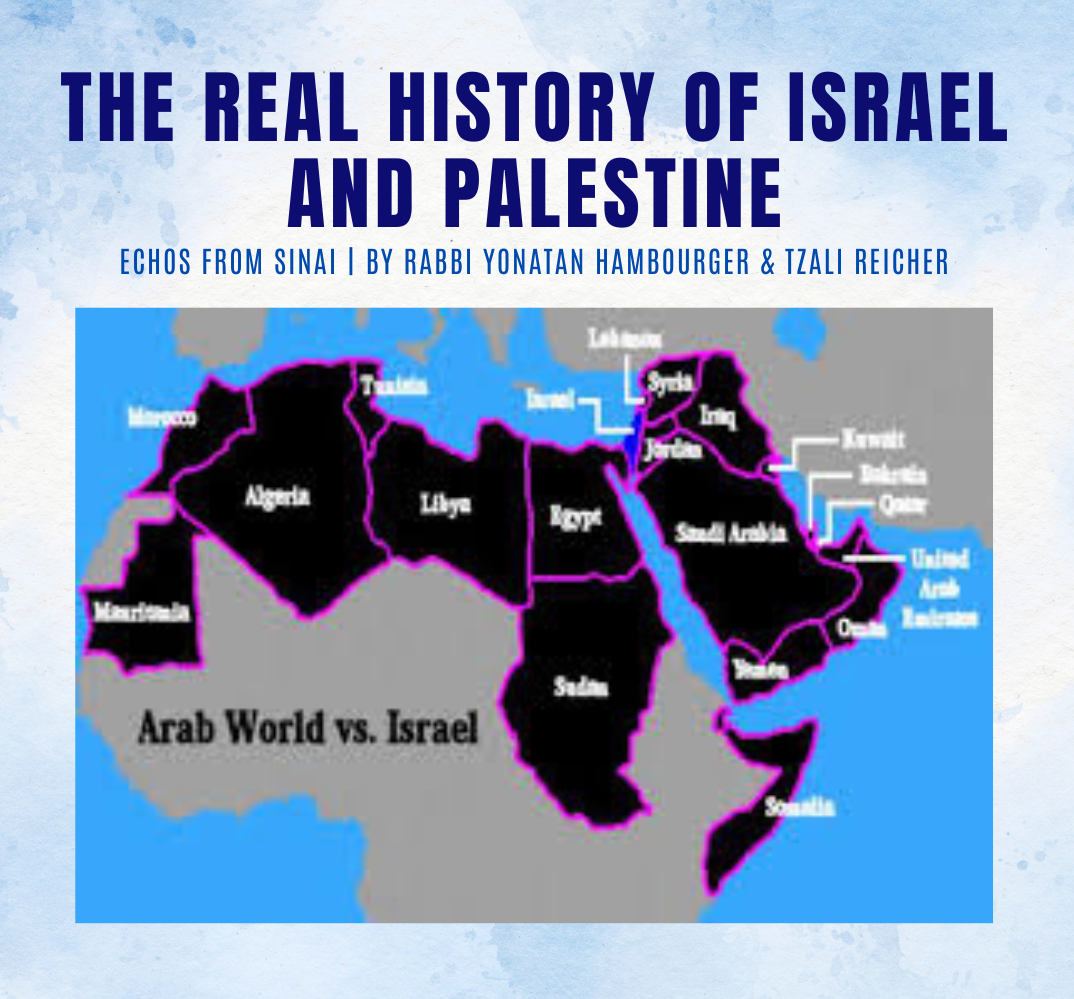
The Real History of Israel and Palestine
By Yonatan Hambourger and Tzali Reicher
When people speak about the Israel-Palestinian conflict, the conversation tends to fall into familiar tropes: Israel was a freebie given to the Jews as an apology for the Holocaust, the Jewish people’s only claim to Israel is in a supposedly mythical Bible, Palestine was a state before they were colonized by the British who shipped usurping Jews in, and there was no tension between Jews and Arabs before the Balfour Declaration in 1917 or the establishment of the State of Israel in 1948.
All of this is incorrect, and something that requires more education and widespread knowledge to correct the record and counter the prevailing narratives dominating the discourse today.
The Jewish people are indigenous to the land of Israel. There has been a continuous Jewish presence in the Holy Land from time immemorial. The Jewish people’s first association is mentioned in the Bible when God commands Abraham to go to Cannan for the first time, and Abraham proceeds to buy land from the ancient (now non-existent) people of his time. He expands his brood that will grow to be the Jewish people in places and cities that still exist today, and prove the Jewish connection to the land since their inception as a nation in 1855 B.C.E., around 2,500 years before the founding of Islam.
Throughout the Bible, as verified by the archaeological sites uncovered in Israel, the Jewish people lived there and survived various exiles and displacements to return with Joshua around 1400 B.C.E. For the next millennium, the Jews were primarily based in Israel, and served G-d first with the Tabernacle in the still existent town of Shiloh and then in the two Temples in Jerusalem on the now Temple Mount. They had many rulers and leaders in this period, including David, Solomon, Saul and Samuel, and relics of that time have been dug up to enlighten us about that era over recent decades. Jesus himself was born towards the end of this time period, about 600 years before Islam was founded.
After the destruction of the Temples in the Babylonian and then Roman times of global dominance, Jewish independent sovereignty was lost from 70 Common Era (C.E.) till 1948: just 75 years ago. Despite their right to self-determination taken from them, Jews maintained a consistent presence in their homeland despite the ensuing parade of invaders of the next centuries, beginning with the Romans. The Romans imposed a colonial state (approx. 70 CE- 324 CE) on the Jewish people and renamed the area Syria-Palaestina, and eventually many Jews were killed, sold into slavery and exiled.
While the Jewish people were forcibly dispersed across the world, many of them stayed in their land until the height of the Byzantine period (324–638), when a majority were massacred or forced to flee. However, a tenacious group hid and continued the active Jewish people's presence in Israel.
The Prophet Muhammed was born in 570 CE and established Islam, through which various factions and adherents invaded Israel annd remained until 1099 CE. Then came the Crusaders who invaded and overthrew the Muslims until they themselves were unseated in 1291 by Saladin, till the Ottomans conquered the land from 1517-1917.
In 1917, the British Mandate of Palestine occupied Israel following the defeat of the Ottoman Empire in WWI, and issued the Balfour Declaration supporting a Jewish homeland in the region, righting a historic wrong. That dream was fulfilled when the modern State of Israel was re-established in Israel in 1948- a true modern day miracle.
The history of the supposed state of Palestine is considerably shorter. In 1967, after Israel regained control over Jerusalem and the West Bank from Jordan in a defensive war where they beat back five invading armies, the flag and rhetoric of the just three year old Palestinian Liberation Organization-then a recognized terror organization- was adopted, calling for the destruction of Israel and creation of a state bearing the name which Roman and subsequent colonizers had bestowed on it-Palestine- because they had no history of their own there.
Recognizing the reality of the situation and the need to share a small country with a people who had settled there, Israel has advanced peace talks at many times throughout its history to enable the two-state solution, yet have always been rebuffed by Palestinian leaders who refuse to accept a Jewish state, and will try again and again to wish it away through violence and terrorism. Notably Israel unilaterally withdrew from Gaza in 2005 which it had captured from Egypt in 1967. In exchange for its magnanimity, all it got in return was tens of thousands of missiles leading to October 7th.
Israel was not a random country handed to the Jewish people in sympathy after the Holocaust. There was never an independent nation or state of Palestine in history with its own unique identity, currency or leaders that the Jewish people usurped, until one was invented to counter Israel’s establishment and historical claims to the land. The laughable claims that Jews were safe in Muslim lands until the founding of Israel is contradicted by years of Arab massacres on Jewish people for centuries beforehand. Israel doesn't exist because of the Balfour Declaration and isn’t a British colony or a nation of European settlers because the Jewish people are indigenous to the land and have returned home to stay.
History, archeology and most importantly truth testify to Israel’s indisputable right to their own homeland, the only Jewish state in a world with 22 Arab countries and 49 Islamic majority countries, a tiny strip of less than 11 thousand kilometers while the Arab countries comprise 13 million kilometers.
It’s time for the world to get educated and stand on the right side of history against the tidal wave of misinformation and antisemitism that we are witnessing today. The Jewish people have a land of their own, and it's here to stay.
Yonatan Hambourger is a rabbi with Chabad of Rural Georgia. Tzali Reicher is a rabbi and writer currently living in Florida.
February 22, 2024

The Presidents and Me
By Yonatan Hambourger and Tzali Reicher
As an American rabbi, the relationship between our leaders and the Jewish community have always held a personal fascination for me, and the recent observance of Presidents’ Day provided a valuable opportunity for contemplation and indulgence to this area of interest. It was particularly interesting to look into the history and lessons that we can glean with 250 years of history behind us.
From the inception of the United States with George Washington, the early presidents were generally devout and religious, maintaining a mutual respect for the Jewish community. John Adams eloquently wrote to Thomas Jefferson, "I will insist that the Hebrews have done more to civilize man than any other nation." Subsequent presidents such as John Q. Adams, Abraham Lincoln, Teddy Roosevelt, Woodrow Wilson, and Warren G. Harding expressed their aspirations for the Jewish people to reestablish a formal state in their homeland of Israel.
Notably, Millard Fillmore and Martin Van Buren denounced anti-Semitic attacks and discrimination, while Rutherford B. Hayes displayed a unique gesture of solidarity for his day by attending a Passover seder with Jewish soldiers under his command. A seder is now celebrated annually in the White House. The only Jewish expulsion in American history occurred in 1862, orchestrated by then-Union General Ulysses S. Grant in parts of Tennessee, Mississippi, and Kentucky. Grant, however, sought to make amends for this regrettable incident during his presidency.
In more contemporary history, the president's relationships with the Jewish community have been more complicated.
Franklin D. Roosevelt’s legacy is hotly debated for his actions during the Holocaust. However, it is a fact that he played a pivotal role in leading the war effort against Nazism, regardless of his underlying motivations. Harry Truman, in a contrasting vein, recognized Israel's independence within 11 minutes of its declaration, yet his public remarks about Jewish people were occasionally derisive.
Despite the Kennedy family's historical association with Nazis, they proudly identified as Zionists, while Richard Nixon, despite personal animosity towards Jews, strategically supported Israel during the Yom Kippur War. Jimmy Carter's actions before and after his presidency offended many in the Jewish community; a situation partially remedied by Ronald Reagan's warm embrace of overt religiosity and Israel.
Subsequent administrations showed varying degrees of warmth towards America's primary ally in the region. Despite his much speculated ambivalence towards the Jewish state, George H.W. Bush facilitated the airlift of 14,325 Ethiopian Jews living in peril, to Israel in a 36-hour period. While Barack Obama maintained relatively cooler ties, Bill Clinton, George W. Bush, Donald Trump, and Joe Biden consistently fostered positive relationships with Israel and extended gestures to the Jewish community during their respective presidencies.
There are a few things we can see from the dynamics between America’s leaders and a small, albeit proud, faith group well represented in the United States.
The first is that even before the establishment of the modern State of Israel in 1948, the historical significance and importance of the Land of Israel to the Jewish faith was always understood and respected by the U.S. The Muslim faith has Mecca along with 49 Muslim countries and 22 Arab countries, while the Jewish people have but a sliver of land in the Middle East, smaller than New Jersey. While there has been a continual presence of Jews in Israel from time immemorial, they did not have self-rule for almost 2,000 years until their dream was realized, thanks in large part to U.S. support. What’s clear is how presidents practically dealt with Israel dictated their relationships with American Jewry for better and for worse. Yes, American Jews are proudly American, but there is always Israel in their hearts, because there are three basic pillars of Judaism from which all else springs: The G-d of Israel, the Torah of Israel, and the Land of Israel.
Another standout lesson is how lucky we all are that our leaders have remained true to the founding principles of this great country. Founded with a call for religious freedom and liberty to all, the United States has been a light onto the world, inspiring generations who have been attracted to promises and privileges afforded to those fortunate enough to live here. After centuries of persecution, the Jewish community in the United States is the largest outside of Israel, and a proud and important fabric in this amazing tapestry that connects all Americans, regardless of race, religion, or creed. It’s an honor American Jews do not take for granted.
Yonatan Hambourger is a rabbi with Chabad of Rural Georgia. Tzali Reicher is a rabbi and writer currently living in New York.
February 15, 2024

The War Needs a Real Resolution
By Yonatan Hambourger and Tzali Reicher
Last Sunday, over 120 million people tuned in to watch a captivating drama play out in a Las Vegas stadium. Two teams, coming off a grueling six-month season to make this final stage, duked it out in Super Bowl LVIII for the right to be called victors, in a heart stopping contest that wasn’t decided until the very last play. Ultimately, the team that embraced lessons from their past seasons, both winning and losing, and played till the final whistle, won.
At the exact same time, on a real battlefield in Gaza, a fraction of CBS’s audience watched something even more consequential unfold. In a daring and brave operation, a team of Israel Defense Force special forces went into Rafah, the last remaining Hamas stronghold in Gaza, and rescued two Jewish hostages abducted on October 7th, right under the noses of the terrorists guarding them in captivity.
Rafah may sound familiar to some readers following the ongoing Israel-Hamas war. It’s the city where thousands of Hamas militants are suspected of being embedded in the civilian population that fled there after Israel began operating in Gaza following the Hamas massacre in October. In what can only be described as a capitulation to terrorism, several leading political figures have announced that Israel must not enter Rafah, amongst them Alexandria Ocasio-Cortez saying going into Rafah is not war, but “an outright attack on the innocent”. Even President Joe Biden, who until recently was supportive of Israel protecting itself from the genocidal terror organization on its borders, has come out much more forcefully against Israel’s announced moves into the city.
Even if Israel hadn’t demonstrated the need for an incursion into Rafah hours after Biden’s statement through the successful rescue of innocent Israeli hostages, there is no historical precedent for what many are asking Israel to do: stop a war they are clearly winning and have the moral high ground in, and just give it up for nothing in return.
Finishing the enemy that began a fight is crucial to ensuring they never do it again, and this is a principle that has proven true throughout our entire human history. Consider the absurdity it would have been if the Allies, having successfully repelled the Nazi invasion in World War II, halted just outside Berlin to negotiate a mutually agreeable end to the disaster Germany had unleashed on the world. Israel ensuring total demilitarization and deradicalization of Gaza, the surrender of Hamas leaders and, the return of the innocent hostages, is the only way to guarantee the atrocities of October 7th never happen again, and the region can move toward a productive and prosperous future. Exactly like Europe did following WWII.
War is tragic and war is brutal, and it always has been so. Were Hamas to surrender and give up the hostages, there would be no more loss of civilian life except at the hands of Hamas’ perpetual brutality against its own people. Israel cannot be expected to let Hamas get away and leave the war unfinished, rewarding them for employing tactics including the horrific use of human shields and embedding terrorists in hospitals, schools, mosques, and civilian centers. Not only is there nothing resembling “genocide” or “ethnic cleansing”, even John Kirby, of the National Security Council in the White House said that he doubts anyone would do as good a job as Israel at protecting civilian lives, including the U.S.
Additionally, it's not as if Israel is the only party affected by a potential surrender. The United States’ deterrent capabilities used to protect our interests in the middle east have been degraded as terrorist-aligned forces backed by Iran, have attacked U.S. armed forces hundreds of times including the recent tragic deaths at the hands of Iranian proxies of Sgt. Kennedy Sanders, Staff Sgt. William Jerome Rivers, and Sgt. Breonna Alexsondria Moffett, from our home state of Georgia. Caving into unreasonable demands for a unilateral surrender to organizations committed to the destruction of Israel and the U.S., simply because we’re tired of war is an untenable position that will only encourage our enemies to attack us again and again until we’re completely at their mercy. To regain our international credibility and authority, a muscular and peace-through-strength approach is needed, with a conclusive end to the war on Israel’s and the United States’ own righteous terms.
As the war between Israel and Hamas continues, the lessons from history echo loudly. It's a lesson as old as Biblical times, when King Saul didn’t heed God’s warning to finish the war against Amalek and instead let the wicked enemy live, allowing them to return with a vengeance seeking to harm the Jewish people, time and time again, for generations. Wars are not won through half-measures or hasty retreats, and they are not won by calculating domestic political considerations and pandering to a loud, minority base. Conflicts are won, and ended, by confronting and neutralizing threats decisively, and playing till the final whistle.
Yonatan Hambourger is a rabbi with Chabad of Rural Georgia. Tzali Reicher is a rabbi and writer currently living in New York.
February 8, 2024
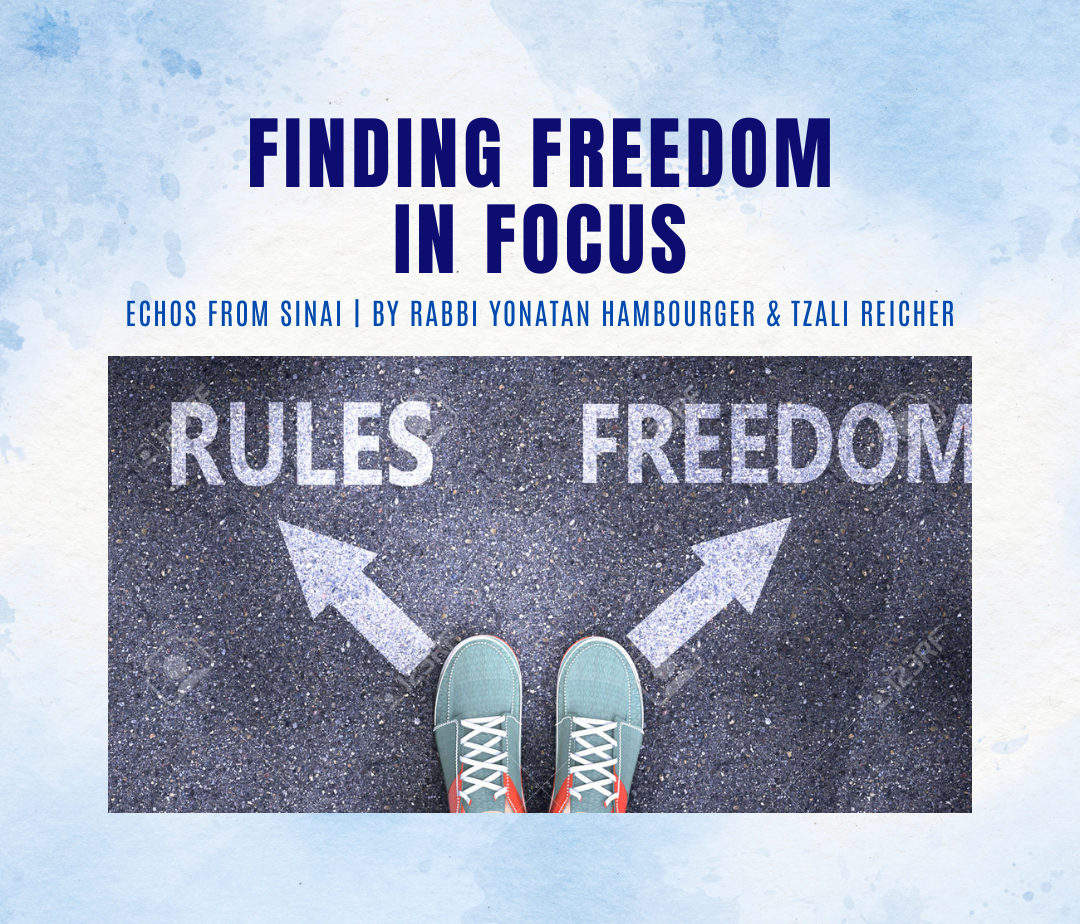
Finding Freedom In Focus
By Yonatan Hambourger and Tzali Reicher
For as long as history has been recorded, there has been a paradox that has confounded societies. It’s the delicate dance between the desire for unfettered freedom, and the innate yearning for structure and discipline-that feeling of knowing we’re tethered to something that has a proven history of giving us the grounding and fulfillment we crave.
In the modern world, the call for freedom resounds through the ages. The Woodstock generation broke from their conservative parents and championed free love and alternative spirituality. The Apple generation called for its users to break free of conformity in their “Orwellian” 1984 Super Bowl commercial, while more and more permissive agendas are mainstreamed to the youth of today, to let them figure it all out for themselves. We champion autonomy and the ability to cast off the perceived shackles of tradition and rules, and the allure of unrestrained choice seems intoxicating, promising a life untethered and unburdened.
However, beneath this surface desire lies a more profound truth—that human beings, in their quest for meaning, find solace, purpose, and fulfillment within the confines of structure and discipline. This is proven by the historical outcomes of mass movements for unrestrained freedom: The ‘Summer of 69’ era crashed under the weight of psychedelics and decadence. Apple has become the cultural enslaver it claimed to be fighting, most recently with its launch of a face computer that will inevitably hasten the disconnection and alienation many of us are already experiencing. And we see that today’s youth are more discontent, unhappy, and depressed than previous generations, in a total repudiation of the experimental open and digital society that they have been the guinea pigs for.
There’s a reason Jordan Peterson’s "12 Rules for Life" became an international bestseller. It served as a roadmap for a disaffected generation craving a guidebook on how to reach a stable footing in a volatile world that they had not been equipped to face. These rules and guidelines paradoxically lead to a sense of purpose and order.
This past week, Jewish communities around the world studied the Torah portion of Mishpatim (Laws) in the book of Exodus, which include some of the denser chapters in the entire Pentateuch. Verse after verse is filled with law and law, telling the recently confirmed Children of Israel (as of the events of Mt. Sinai in the previous chapter) the rules by which they must live for all time. While the earlier parts of the Torah told the pulsating stories of creation, the patriarchs, and the escape from slavery in Egypt, there is no dramatic respite in Mishpatim: we just have a lengthy list of commandments and prohibitions, governing the Jewish people on the issues of commerce, dietary restrictions, capital punishment, how to observe the festivals, and more. In all, there are 53 commandments in this Torah portion alone.
These detailed laws were given to the Jewish people immediately following the ‘main presentation’ at Mount Sinai, when G-d descended in fire on the mountain while smoke billowed like from a furnace as He gave over His wisdom. After the heady and euphoric events that brought the Jewish people together on the once humble mountain, in Mishpatim, G-d presented a roadmap for how they were to live in a society seeking order, justice and fulfillment.
This smoke and fire, tangible manifestations of the divine presence, are symbolic of passion. There is a connection between the fire and smoke that appeared at Mount Sinai and the laws that were taught there: that when performing even the most routine and mundane acts, they must be infused with passion. Discipline should not be mechanical; it should be a vehicle for channeling one's inner fire towards a purposeful life. When we lose sight of why we follow traditional and disciplined pathways to success, that is when self-defeating untrained ‘freedom’ festers and leads to disinterest and dissatisfaction. In the pursuit of rules and discipline, there is an unseen fire—one that burns within the heart of every individual seeking a meaningful existence.
Apathy and disengagement stand as formidable adversaries to achievement and success. In a world that often glorifies apathetic and cool detachment, in favor of a hedonistic living for the now, the wisdom of the Torah’s lessons beckons us to resist the temptation of indifference. True fulfillment is not found in the absence of rules but in the active engagement with them—with a passion that transforms routine into purpose and discipline into a pathway to greatness.
Yonatan Hambourger is a rabbi with Chabad of Rural Georgia. Tzali Reicher is a rabbi and writer currently living in New York.
February 1, 2024

Yisro and the American Dream
By Yonatan Hambourger and Tzali Reicher
Yisro (or Jethro) “had it made” in his ancient home of Midyan, thought to be somewhere in the north-west of the now-Saudi Arabia. He was the leader of his pagan faith, a wealthy man, and a family man with seven daughters and a couple of grandchildren, and proudly had Moses-who had just led the enslaved Children of Israel out of Egypt and split the Red Sea-as a son in law.
On the heels of the miraculous events, we’ve discussed in the earlier chapter of Exodus, Yisro traveled into the desert to reunite with Moses and to witness the miracles for himself. Moses accorded him much respect, followed his suggestions about decentralizing the leadership structure, and spoke of the miracles they’d experienced up till now. Thoroughly convinced of the truth of the one eternal G-d, Yisro decided to cast away all of his life’s beliefs and throw his lot in with the Jewish people, standing humbly with them to receive the Torah at the foot of Mount Sinai.
His turnabout is remarkable, but that isn’t what is most striking about this story.
Yisro was not a young man, and his legacy had already been cemented. He was revered in his native land and was at the pinnacle of his religion. Happily surrounded by his large family, he could have lived out his days content in his service and life achievements.
But he couldn’t do that. Once Yisro saw what he perceived to be ‘the light,’ he couldn’t ignore it. As Rabbi Menachem M. Schneerson, of righteous memory, the most influential rabbi in modern history wrote in Hayom Yom: “In spiritual matters one should always look at he who is higher than oneself, and plead with G‑d to grant him the intelligence to learn from the other, and the ability and strength to rise higher”. And Yisro wanted to rise higher. And so, Yisro made the brave and bold choice to start again in his spiritual journey, giving up his life of comfort and security to create a meaningful relationship with G-d.
The common interpretation of the American Dream often reduces it to the pursuit of material wealth or financial success. However, this simplistic view does not capture the essence of the enduring creed that our nation has embraced since its inception. If it were solely about opulence, then affluent individuals such as sheiks in Dubai and oligarchs in the former Soviet blocs could be considered as living the American Dream, reveling in their luxurious mansions, cars, and artwork.
Instead, the American Dream embodies the liberty to pursue success, opportunity, and fulfillment. Here in America, we are privileged with the right to chart our own course in achieving these goals. Rather than being bound to a rigid system or ideology, we possess the freedom to explore and discover the truths that align with our values—a legacy we aspire to pass on to future generations. The story of Yisro’s spiritual journey resonates deeply with this theme.
Yisro’s story is that he had it all and gave it up for a chance at spiritual fulfillment, along with true meaning and purpose. He chose to forge a new path, one aligned with his newfound understanding and conviction, and challenged the conventional notion of fulfillment and success tied solely to material wealth. He is a shining example of the enlightenment one can reach with the profound freedom to pursue a higher purpose, even a freedom from the trappings of fortune and fame.
The American Dream is not a static destination but a dynamic, evolving pursuit of a meaningful and purposeful life. Yisro's choice to abandon the familiar, echoes the spirit of those who have come to America seeking a new beginning, free from the constraints of the past, whether that be you or your ancestors.
Yisro's narrative serves as a poignant reminder that the American Dream is not confined to a specific demographic or defined by accumulated possessions. It is a universal call to explore, question, and, if necessary, redefine one's legacy in pursuit of a more profound understanding of life's purpose. Yisro teaches us that true success lies in the courage to choose spiritual fulfillment over the comfort of comfort and conformity.
Yonatan Hambourger is a rabbi with Chabad of Rural Georgia. Tzali Reicher is a rabbi and writer currently living in New York.
January 25, 2024
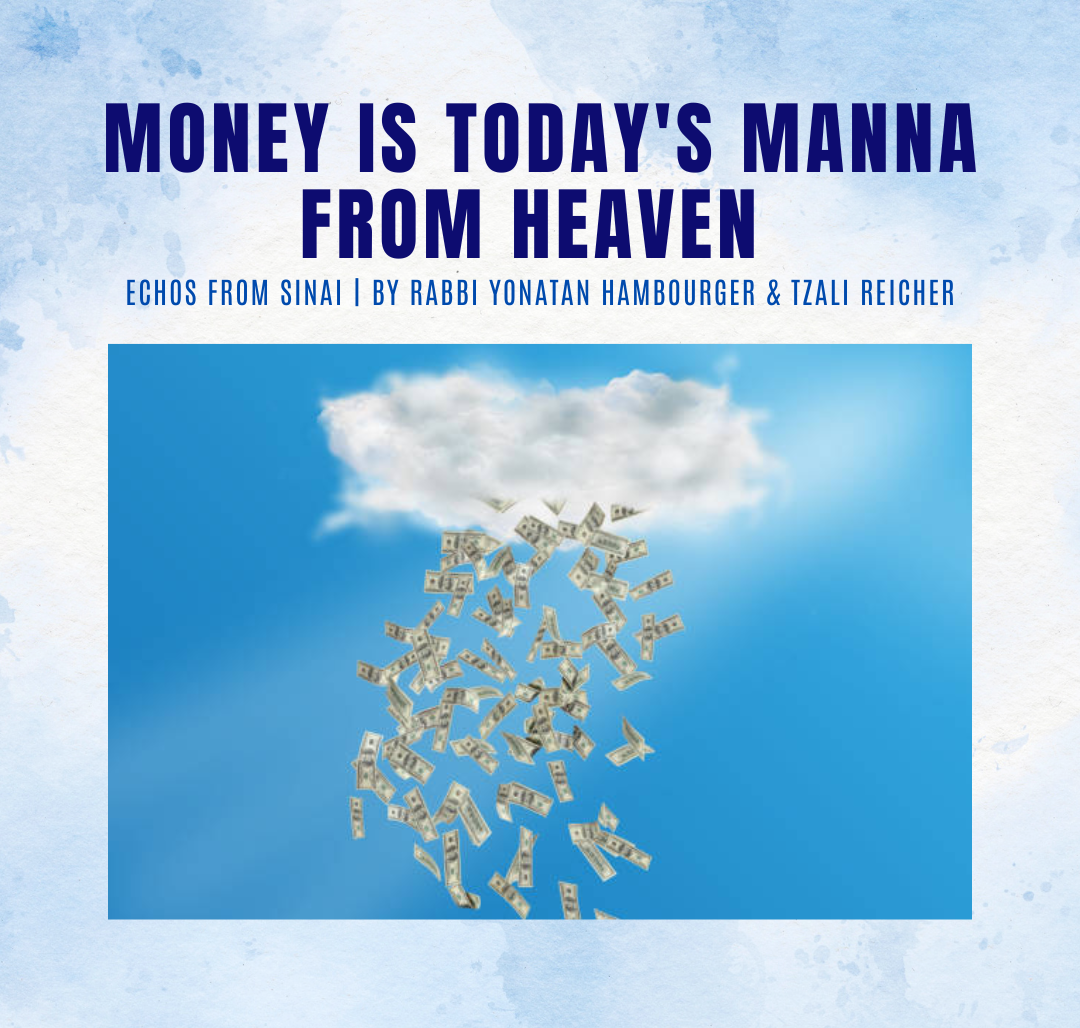
Money Is Today's Manna from Heaven
By Yonatan Hambourger and Tzali Reicher
The Children of Israel had been through a lot since G-d led them out of Egypt in ‘shock and awe’ fashion, as Jewish communities will read this week in the portion of the Torah that describes the exodus. After two centuries of slavery, Moses was leading the Israelites back to their indigenous homeland of Israel. On the way, they crossed the Red Sea in miraculous fashion and were now beginning their 40 year trek through the desert when a most practical question arose: what would they eat in the barren and desolate wasteland on their long way home?
The answer: the mysterious- and miraculous- manna from Heaven.
Moses explained to his people that every morning, this thin bread would fall from the skies above in specific portion sizes, and it would sustain them for the whole day, and that any leftovers would spoil. It would taste like anything they could conjure in their mind- all they had to do was think it, and so it would taste.
The renowned mystic and sage of 19th century Russia, Rabbi Schneur Zalman of Liadi, the founder of the Chabad-Lubavitch Hasidic movement, was wont of saying that “we must live with the times”, explaining that we must not only read the Torah portion of the week as an intellectual exercise, but seek to apply its lessons to our current day and personal realities.
So, what can we learn from the Biblical story of holy bread falling from the skies?
It’s more relatable than you might think.
Our Country is a remarkable miracle. Born with the revolutionary spirit of our Founding Fathers, for 250 years our nation has stood as a beacon of hope, freedom, and possibility, leading it to become the most prosperous and admired nation in the history of the world.
There are those who see their own prosperity as the gift from G-d that it is. These people humbly recognize the fortunate position they’re in from G-d having blessed their own hard work; and they pay this gift forward. They give charity, support their community institutions, and share with others less privileged, and never take their blessings for granted. Sure, they enjoy themselves and even live large, but they still value the important things and have their priorities in order.
But sometimes G-d blesses those people who don’t appreciate their prosperity for the gift that it is. The Bible speaks of this arrogance in Isiah 10, describing people who don’t credit G-d and say, “With the strength of my hand I accomplished it, and with my wisdom, for I am clever”. This sort of “successful” person only facilitates the culture of materialism, consumerism and “keeping up with the Joneses' ' that has challenged recent generations, particularly the youth.
The lesson from this week's Torah portion is that we must ensure that our relationship with money and material success is healthy and generous, and that we see it for the blessing it is.
It is no different than manna from Heaven, a blessing that will sustain us and turn into whatever we desire it to be, whether we use it to support our family, celebrate a happy occasion, or even go away on a special vacation to rejuvenate our mind and soul. But like manna which became spoiled when people hoarded it out of lack of trust in G-d’s providence, money also becomes spoiled when it is abused, while corrupting those whom G-d entrusted this blessing with.
Believers know that G-d has determined their path and will help them in their efforts. In return He wants to see you do your part and open a channel by which to receive His blessing. For most people, that means working hard and applying yourself to earn this blessing, while being
generous, charitable and humble to show yourself to be a worthy recipient.
And if there is anything I know about the people of this great State, it’s that this lesson is something you already live with.
Yonatan Hambourger is a rabbi with Chabad of Rural Georgia. Tzali Reicher is a rabbi and writer currently based in New York.
January 18, 2024
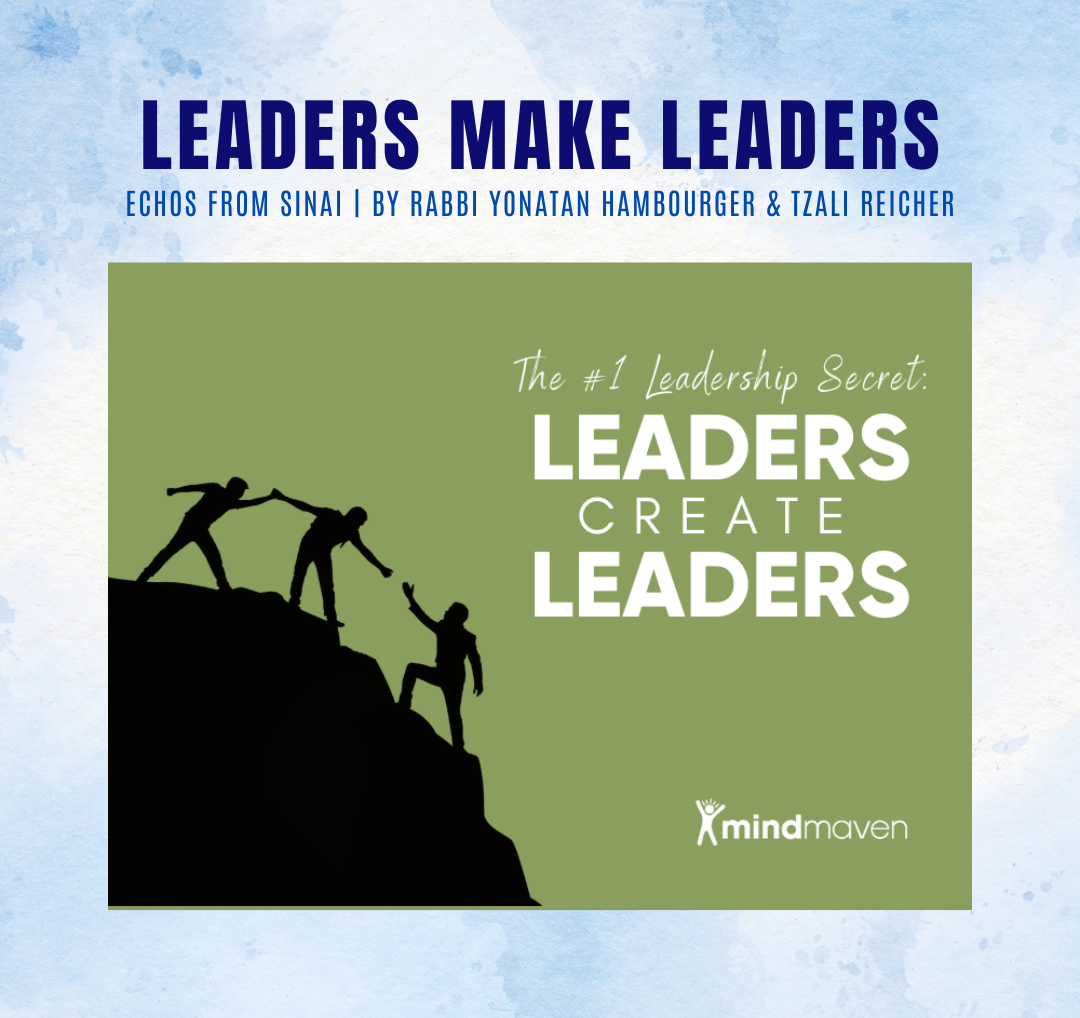
Leaders Make Leaders
In an era marked by soaring levels of anxiety and plummeting self-esteem, closely linked to the surge of social media and the voyeuristic observation of others' performative lives aimed at garnering ‘likes’, many Americans find themselves disempowered, inferior, and adrift.
This sentiment was entirely foreign to the Rebbe, Rabbi Menachem M. Schneerson, of righteous memory, the most influential leader in modern Jewish history.
This past weekend marked a special day for world Jewry. Communities around the world marked the anniversary of the day the Rebbe accepted the leadership of the Chabad-Lubavitch movement in 1951 and became the architect of the post-Holocaust Jewish renaissance.
His remarkable accomplishments endure as a testament to his legacy, even 29 years after his passing. He orchestrated the dispatch of over 4,000 rabbinic couples to lead communities in 80 countries worldwide, a feat that remains unparalleled. Additionally, his influence extends to scholarship, with a prodigious library boasting hundreds of published books covering a wide array of topics—from Judaism to international affairs. These publications were curated from the extensive material derived from the literal tens of thousands of hours the Rebbe spent addressing the public.
Throughout his lifetime, a diverse array of statesmen and artists, including Ronald Reagan, Robert F. Kennedy, Yitzchak Rabin, Menachem Begin, Elie Wiesel, and Bob Dylan, sought his counsel, underscoring the breadth of his impact. The reverberations of his achievements continue to be widely celebrated. Every year on the Rebbe's birthday, every U.S. president, starting with President Jimmy Carter, has designated Education Day U.S.A. to honor his unwavering commitment to education, and in 1994, Congress bestowed upon the Rebbe the prestigious Congressional Gold Medal- the only rabbi to ever receive this honor.
As time progresses following the Rebbe's passing, his significance and appreciation have grown. Each year witnesses the release of numerous books about him and his wisdom, and an increasing number of rabbis-many even born after his passing- operate in his name, venturing to remote areas to connect with Jewish individuals and communities wherever they may be. His resting place is revered as a site of profound spiritual sanctity. Hundreds of thousands of individuals, both Jews and non-Jews, visit this sacred location every year, seeking blessings, spiritual guidance, and inspiration, including leaders such as New York Mayor Eric Adams, President of Argentina Javier Milei and personalities including supermodel Naomi Campbell, basketball great Lamar Odom, and popstar Paula Abdul.
The question is obvious. How did a Russian-born immigrant rabbi, who spent his last 40 years essentially in a three block radius in Brooklyn, inspire such devotion and following that has only grown and spread around the world since he passed?
The answer might be found in this thought the late great Chief Rabbi Jonathan Sacks of the United King used to say: “I had been told that the Rebbe was a man with thousands of followers. After I met him, I understood that the opposite was the case. A good leader creates followers. A great leader creates leaders. More than the Rebbe was a leader, he created leadership in others.”
From the moment he accepted the leadership in the small Brooklyn synagogue from which he would go on to change the face of world Jewry over the next four decades, the Rebbe addressed his personal philosophy about the need for leaders to empower and lift up others in his opening address, which he labeled his mission statement.
The Rebbe challenged the common expectation that followers could passively delegate all responsibilities to their appointed leaders, emphasizing that nominal connections to individuals of higher status or spiritual standing didn't exempt them from personal effort. The Rebbe's leadership style involved guiding and assisting his followers, but he insisted they must invest their own effort to attain spiritual and material heights.
In numerous meetings and letters, the Rebbe uplifted and motivated those who believed they had reached their limits, whether proud achievers or those lost and despondent. His consistent message was clear: there is always more one can do, and no one has yet come close to tapping into their ultimate potential that G-d has blessed us with.
This message holds particular significance in our present age, dominated by our enslavement to devices that have eroded our G-d-given attention spans and work ethics. Whether feeling unaccomplished, lazy, or overly content with past achievements, the Rebbe's empowering message of continuous growth and possibilities resonates: we must be leaders who foster more leaders, thereby cultivating further success. There is always room for improvement, and we can always do more to make the world a better place for all.
Yonatan Hambourger is an Atlanta-based rabbi with Chabad of Rural Georgia, while Tzali Reicher is a rabbi and writer currently residing in New York.
January 11, 2024

The Importance of Defining Antisemitism
In December, the entire world witnessed the disastrous hearing on Capitol Hill investigating the massive surge of antisemitism and pro-Hamas extremism on elite campuses, where three leading ‘academics’ debased and twisted themselves into knots to say calls for the genocide of Jews and the Jewish state wouldn’t be punished under their school guidelines unless it was accompanied by action (which would be the genocide of Jews…?). The trio were roundly condemned. One was first to step down immediately after the hearing, another resigned from her post after her callous performance led to an investigation into her crooked history of plagiarism, while another remains in her role.
This story is perhaps the most recent example of what Jews have known for a long time: Jews are not allowed to define antisemitism and Jew-hatred. Rather, Jews are told what counts as hate and what is allowed to remain in the public discourse, while every other group rightly gets to determine what is offensive and hurtful to them, all by themselves. These academics only got called out because their performance was so shambolic and brazen that it couldn’t be ignored, despite the fact that the sentiments are expressed and believed by a terrifyingly growing number of people around the world.
It’s part of what has been defined as “wokeism” and the ‘pyramid of oppression’. Leaders in politics and entertainment work overtime to ensure they ‘correctly’ serve and respect the many diverse communities under their purview in the way they appreciate being treated, but because Jews are seen as having been able to overcome their historic oppression, status as a tiny nation in the world, and have been able to create and lead many valuable public facing institutions- Jews don’t count.
Since October 7’s Hamas massacre on Israel, this difference in treatment has never been starker.
Somehow, despite seeing 1,200 of its citizens brutally murdered, tortured, beheaded, burnt alive, kidnapped, and raped by roving bands of pillaging terrorists and civilians committing acts of medieval barbarism, it is Israel who is demonized for its response.
World leaders have called for restraint and for Israel to scale back its response to Hamas, saying it cannot be dismantled because it’s not a group but an idea, and would only radicalize future generations. No one would reasonably argue today that the Allies were wrong to sack Europe in their successful campaign to crush the Nazis despite the death and destruction inflicted on civilians. No one would reasonably argue today that the U.S. Military was wrong to invade territory occupied by ISIS and Al-Qaeda in order to degrade and eradicate these menaces who threatened the free world. One cannot allow themselves to be held hostage and forced to negotiate with and accept terrorists who intentionally lodge themselves within civilian areas, hoping to exploit the blood of innocents in the world press. The innocents’ blood is in fact on the terrorists’ hands. Rather, democratic countries are compelled to fight to uproot terrorists who threaten ones’ citizens and sovereignty.
Less restrained commentators hysterically claim Israel is perpetuating a genocide on Gaza, despite Israel’s ratio of innocent victims to terrorists-despite the tragic loss of every human life-is better than any war in history. They offensively paint Israel as Nazis, the purveyors of the largest genocide of Jews in history, seeking to connect Jews with their own oppressors in a despicable attempt to convince the world of their false claims.
And this is why I support the efforts of the Faith and Freedom Coalition to pass the International Holocaust Remembrance Alliance (IHRA) definition of antisemitism into Georgia law.
This is the IHRA working definition: “Antisemitism is a certain perception of Jews, which may be expressed as hatred toward Jews. Rhetorical and physical manifestations of antisemitism are directed toward Jewish or non-Jewish individuals and/or their property, toward Jewish community institutions and religious facilities.”
The IHRA provides examples of antisemitic behavior, such as unfairly singling out Israel, the Jewish state, for criticism while neglecting similar global issues. It mentions the denial or diminishment of the Holocaust, including its scope, mechanisms, and the Nazi's intentions, and highlights inappropriate comparisons of modern Israeli policies to those of the Nazis. It also discusses the unjust collective blaming of all Jews for the actions of Israel, and unfounded allegations against Jews or Israel regarding the Holocaust, pointing out the problematic accusation that Jewish citizens prioritize Israel or Jewish global interests over their own nation's interests. Furthermore, it addresses the denial of Jewish self-determination by labeling Israel's existence as racist.
Predictably, antisemites and Jihadist extremists don’t like this definition, saying it exists to muzzle critics of Israel, despite the fact it explicitly says, “criticism of Israel similar to that leveled against any other country cannot be regarded as antisemitic.” They’ve even sought to create and disseminate their own tortured descriptions of antisemitism that allow for the continued demonization of Jews, but mercifully they haven’t got traction in their cynical efforts to mainstream Jew hatred.
It’s time the world recognized the Jews right to define what counts as hatred and antisemitism for themselves, particularly as all the antisemitic tropes defined as explicit Jew-hatred are seen more and more online and in the real world.
The Georgia legislature should take up and pass House Bill 30, and show the broader community that here, we don’t tolerate hatred, intolerance, and demonization.
Please urge your elected officials to pass House Bill 30 by calling or emailing today. You will find your State Senator here: https://www.legis.ga.gov/members/senate. Together we will make a difference!
Yonatan Hambourger is an Atlanta-based rabbi with Chabad of Rural Georgia, while Tzali Reicher is a rabbi and writer currently residing in New York.
January 4, 2024
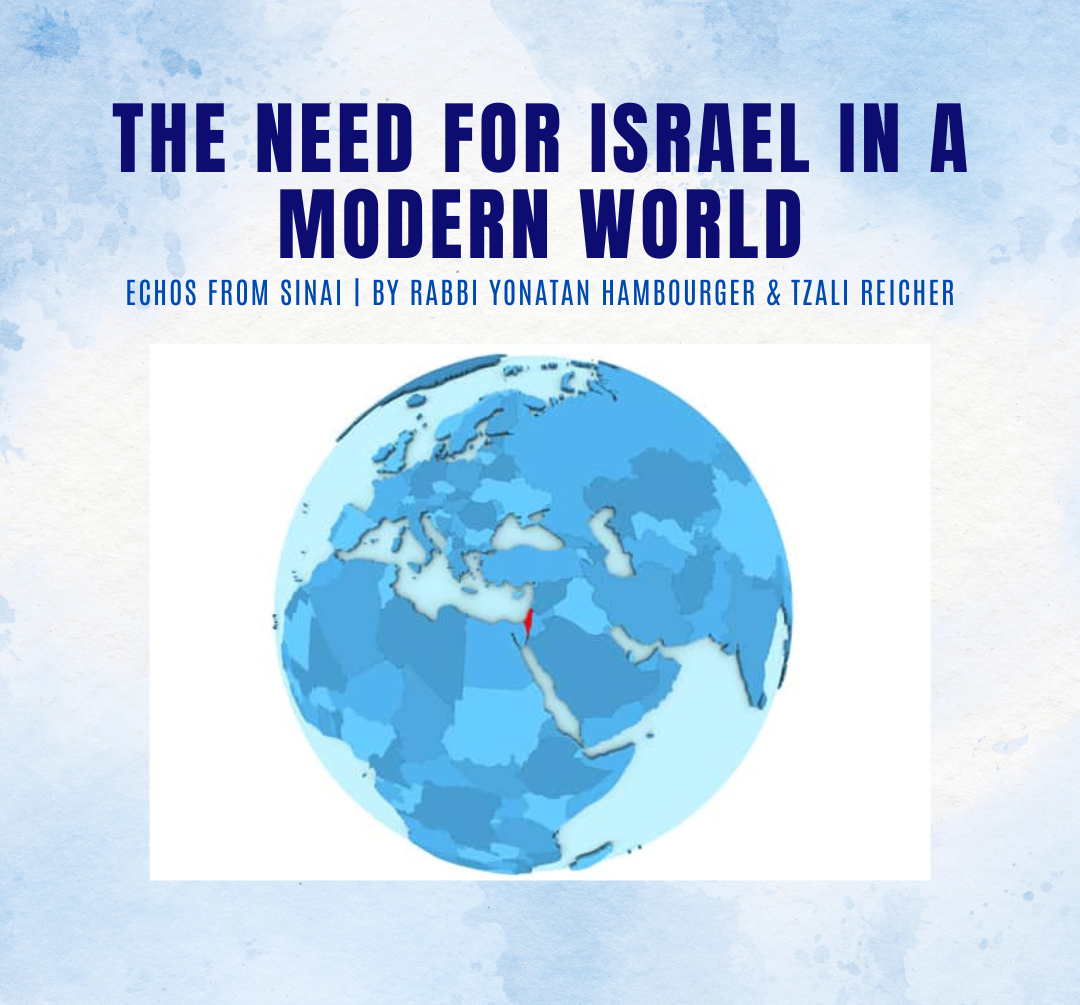
The Need for Israel in a Modern World
In recent weeks, Jewish communities worldwide have been captivated by the timeless tale of Jacob and Joseph as narrated in the latter portion of the Book of Genesis, as they are studied in the weekly Torah portions each week.
The classic story goes that after being sent to Egypt by his envious brothers that were jealous of his close bond with their father Jacob, Joseph underwent a remarkable transformation. The experience he gained from a life of adversity coupled with divine providence enabled Joseph to become a trusted advisor and administrator in his adopted homeland, ascending to the position of viceroy thanks to Pharaoh's recognition of his wisdom. Joseph's sage counsel was instrumental in safeguarding Egypt from the devastating seven-year famine that would have otherwise ravaged the nation. This dire period ultimately led Joseph's brothers to leave their land of Israel for Egypt to seek his assistance, resulting in a sincere apology and mending of relations, followed by a heartfelt reunion with his father, who never gave up hope of reuniting with his son throughout the 17 years he was missing.
Moreover, this period of hardship and resilience culminated in the establishment of a vibrant Jewish community in Egypt. This community not only thrived but also garnered the respect and appreciation of their Egyptian neighbors, who acknowledged the Jews vital role in helping establish Egypt as a prosperous nation and the recognized superpower of the day. This legacy endured for centuries, marking a chapter of peace and prosperity for the extended family of Jacob and Joseph in a foreign land.
But in this week's Torah portion, the first of the book of Exodus, the Jews experience a radical change in fortunes. There arises a new king “who did not know Joseph”, which the sages interpret to mean he did not acknowledge the contribution Joseph and the Jews made to Egypt and sought to enslave and enact policies targeting the Jewish community of his time.
Such has been the story of the Jewish people throughout history.
Time and again throughout history, the Jewish community is welcomed for their wisdom and contributions, and celebrated for a number of years, before ‘a new king arises’ and the classic tropes begin playing on the minds of those who have always sought to harm the Jewish people. The Jewish people’s contributions are then twisted against them and framed as a malicious attempt to control the rest of the population. Public resentment is stirred and before long, the Jewish community is attacked and expelled, and forced to start this cycle all over again.
Until the establishment of the modern state of Israel in 1948, Jews were thrown out of ancient Egypt, medieval Babylonia, and modern Europe. Between the year 250 and the year 1948—a period of 1700 years—Jews in Europe experienced an average of one expulsion every 21 years.
Fresh off the largest annihilation of Jewish people in history, thanks in large part to the leadership of the U.S.A., the world-in a rare moment of compassion for the Jewish people-recognized the need for the Jewish people to have a state of their own in their ancestral homeland, smack in the middle of 22 mostly hostile Arab countries. For the first time in 2,000 years, the Jewish people lived autonomously in their homeland and had a state that would serve as the home of a displaced people and could be responsible for ensuring the protection of their own coreligionists. Never again would the Jews be subject to the whims of a volatile leader and citizenry.
Faced with so many existential wars and attacks since its re-establishment in 1948, what is Israel’s secret? How have they managed to repeatedly defeat their enemies and fend off the world’s continuous demonization and obsession with its legitimacy, while simultaneously absorbing hundreds of thousands of penniless Jewish refugees threatened with mass slaughter by the Arab countries where they were living for two thousand years?
Well, it’s a mixture of faith and fortitude, and a recognition of that fact that then-Israeli Prime Minister Golda Meir told now-President Joe Biden in 1973: “We have nowhere else to go.” Those who say there is no need for Israel as a Jewish country in a modern world in favor of a pluralistic and naive “one state solution” ignore the realities of escalating antisemitism in Europe and around the world, and the role Israel plays in ensuring the safety of the global Jewish population.
Antisemitism has been on the rise in Europe and beyond. Jewish communities, particularly in France, have witnessed a mass exodus due to the alarming surge in antisemitism. In England, the occurrence of over 50 daily antisemitic incidents, including large rallies promoting hatred and division, has been deeply unsettling. Australia, too, has seen troubling events that underscore the ongoing threats faced by Jewish populations, with riots featuring chants of “gas the Jews'' capturing worldwide headlines.
The United States is a truly friendly and welcoming country thanks to the ethos of our founding fathers, the divinely inspired U.S. Constitution, and the demonstrative support from the ‘faith-based’ community, and so many others. Jews have flourished in this great country and have made enormous contributions as well. We pray that all of us who love our great country will stand united against the onslaught of those that want to end the American way of life that we all cherish, and that the Jewish people will remain secure as well. Jews in many other places around the world are safer for Israel’s existence and the knowledge there will always be a home for them when the tides turn, as history tells us they always do.
Yonatan Hambourger is an Atlanta-based rabbi working with Chabad of Rural Georgia to teach the richness of Judaism, while Tzali Reicher is a rabbi and writer currently residing in New York.
December 28, 2023
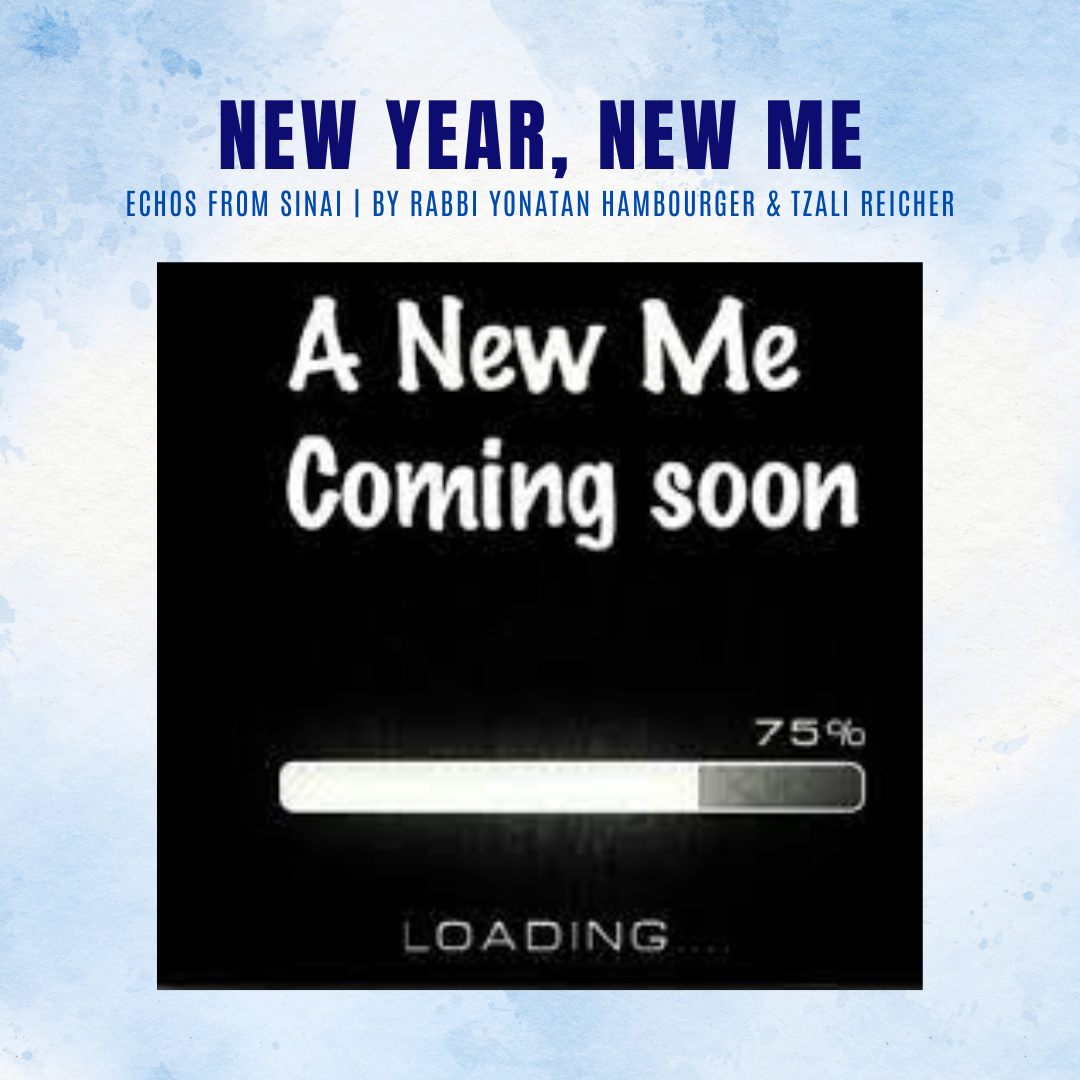
New Year, New Me
The way the Jewish community celebrates Rosh Hashanah-- the Jewish New Year-- often raises eyebrows, and not just because it usually occurs in September.
In a distant cry from the way the majority of the world celebrates the secular New year, with raves and parties to cast the annus horribilis that was the year before aside for the innocent optimism that this upcoming year will be better, Jews spend the New Year - also known as the High Holidays and the Days of Awe- in their local synagogue. On the first day of the Jewish calendar, we affirm G-d’s kingship over us, apologize for the mistakes we made against man and G-d the year before, and ask to be signed and sealed for a good and sweet year ahead.
Why do Jews celebrate their New Year like that? Is there something in the Torah against partying?
Of course not. There are plenty of Jewish holidays marked with joyous celebrations, and we are commanded about our festivals to “rejoice in them”. But when we appreciate the magnitude of the opportunity the New Year presents us with, we can quickly appreciate that it isn’t an occasion we can let slip by with just merrymaking.
The end of one year and the turning of the calendar into the next offers the chance at a clean slate presented only once a year. We can cast aside the burdens of the past, shed the layers of our shortcomings, and embark on a journey towards self-improvement and spiritual growth that only the promise of a New Year can offer. It's a profound moment of reflection and introspection, a time to take stock of our actions, intentions, and the impact we've had on the world around us.
It’s also a time of profound honesty, as G-d accounts for the past year and determines how our next year should look. In that vein, we ask G-d for forgiveness and compassion, and ask the same of our friends and colleagues who we may have wronged or offended to let go of past grievances and move into the new year with peace and tranquility. We set realistic goals, about the growth we’d like to see in our personal, professional, and spiritual pursuits.
All these are lessons that can be applied to the New Year 2024.
Amidst all the revelry and celebrations that have rightfully been earned after a tough year, I urge our readers to create their own Rosh Hashanah Moment and reflect on the events of the past year to influence the direction the next year will take you on.
Think about your 2023. What positive events happened and what less-than-positive things happened, what were the things you did well and what could be done better, and who do you need to make things right with. What are your hopes, goals and aims for the upcoming year, and what can you do now to be the change you’d like to make happen.
It’s taking meaningful and proactively positive steps like these that can transform what is otherwise simply a public holiday into the first day of the best year of your life.
So as January 1st looms, I wish all our readers a sweet and joyful 2024, a year in which all your hopes and dreams are achieved, and you know only blessings. As a nation, we should only experience peace, joy, and sustenance. Our leaders should be blessed with the courage and wisdom to lead us to peaceful outcomes in all our domestic and international challenges and may the United States of America continue to affirm its position as the moral center of the world.
December 21, 2023
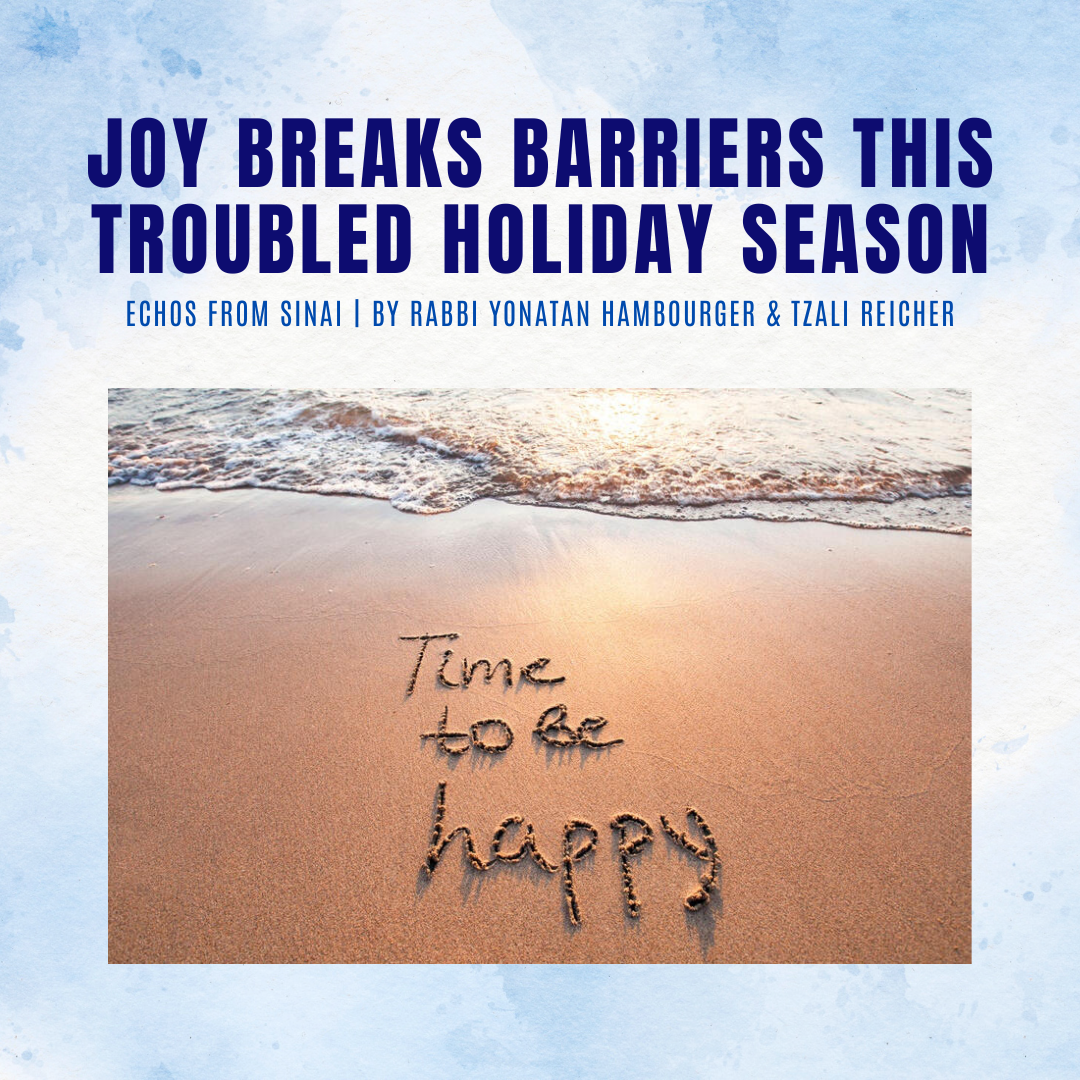
Joy Breaks Barriers This Troubled Holiday Season
As the holiday season approaches, many of us eagerly anticipate the warm embrace of joy and happiness that typically accompanies this time of year. We eagerly await the festive decorations, the cozy gatherings with loved ones, and the giving of thoughtful gifts. Perhaps it’s a quirk of the calendar that somehow many faiths have celebrations in the winter months, be it Hanukkah, Christmas, or Kwanzaa- but it is truly wondrous that there is a joyous holiday for anyone to participate in this festive season.
Holiday cheer is the typical sentiment that defines the month of December, but for countless people, finding joy and happiness this year feels heavier and more challenging than ever. The global events of the last few months, coupled with the many domestic challenges many of us-or people we know- have been facing, have left us grappling with uncertainty and isolation, and confusion about how to celebrate the holidays in good conscience.
And yet we must. We must find that mental bandwidth to celebrate our traditional holidays guilt-free, because only with joy and purpose can we overcome any challenge or adversity.
Let’s explore the importance of joy in Judaism, where the need to be happy is emphasized in many scriptures and teachings: Deuteronomy 28 warns the Jews of dire consequences if they do not serve G-d with happiness and gladness of heart. In Kings II, Chapter 3, we learn that even the prophet Elisha recognized the importance of joy in achieving prophecy. After King Yehoram of Israel aroused Elisha's wrath, a minstrel had to play before him to lift his spirits before he could attain prophecy once again. This story illustrates that a prophet could only connect with the divine when in a state of happiness. The Talmud further emphasizes the significance of joy by stating that the Divine Presence only rests on one who is joyous.
And finally in the daily morning prayer, we are commanded to "serve God with joy," as mentioned in Psalm 100. This commandment reminds us that joy is an integral part of our service to G-d. It is not enough to merely go through the motions; our hearts must be filled with joy and faith as we carry out our divine duties.
But why does God care about our mood? Why is it essential to serve Him with joy?
The answer is simple: Rabbi Schneur Zalman of Liadi in his seminal work The Tanya explains that serving G-d without joy indicates a lack of faith. If someone is upset about their situation, and falls into a melancholic funk (excluding mental health conditions), they are in effect questioning the plan that G-d has for them.
In the midst of those ‘curve balls’ which life throws at us, mustering the faith that it is G-d who has custom-made our challenges out of His love for us, invariably leads to joy, which is the secret to overcoming any challenge. The Jewish motto of “joy breaks all boundaries'' endures, while negativity and pessimism lead to apathy, paralysis, and the abdication of personal responsibility.
This holiday season-precisely when the world feels dark and confusing- is a time for reflection, gratitude, and joy.
It’s a time to thank G-d for and rejoice in the blessings that we have been granted- our families, our homes, our communities and other blessings we typically take for granted- and make an effort to share those blessings with others less fortunate than ourselves. Practicing this gratitude and taking stock of all the good things in our lives, while engaging in acts of service and community, will foster a sense of contentment and joy while making our challenges seem trivial and easily fixable in relation to all the positive things going on. Embracing traditional celebrations with family and friends can serve as an anchor in these troubled days.
Joy is not a mere fleeting emotion but a profound state of being that sustains us through adversity. It serves as a beacon of hope in the darkest of times, reminding us that even in the midst of turmoil we can find light and purpose. By embracing joy and gratitude, we can overcome the long winter darkness, together.
Yonatan Hambourger is an Atlanta-based rabbi with Chabad of Rural Georgia teaching the richness of Judaism, while Tzali Reicher is a rabbi and writer currently residing in New York.
December 14, 2023

As the flooding intensified around Mr. Smith’s house following a torrential storm, his neighbors --surprised he hadn’t left already after multiple warnings--encouraged him to join them as they escaped the devastated area. He politely declines, saying he had faith in G-d to spare him. With the waters rising, emergency services bravely rowed through the streets but Mr. Smith still did not call out for help despite seeing them: he was waiting for his G-d to come through. Passing away hours later, Mr. Smith ascends for his final judgment at which point, disenchanted, he confronts the Lord, asking Him how he could possibly justify the faith Mr. Smith had in Him his whole life. The Lord responded, “I was there all along: I was the warnings, I was the friendly neighbors, I was the emergency services. I was there to help, but first you must help yourself”.
This apocryphal tale is perhaps the perfect example of the Jewish concept of Bitachon (faith) and Hishtadlus (effort; doing your part in what has to be done).
In Judaism, while we do ask for blind trust in G-d, we do not ask for blind faith. G-d doesn’t ask us to throw away the keys and wait for Him, omnipotent as the Lord is, to deliver salvation. Rather G-d asks us to follow His guidance and instructions and proactively do the right thing, and have the faith that He has our best interests in mind and will ensure the best result will eventuate.
Maybe the earliest historic example of faith meeting effort was over 2,000 years ago, when the Jewish people were terrified. Fresh out of centuries of slavery in Egypt and headed back to their homeland Israel, the nation now gathered around Moses amidst swirling rumors the Egyptians were headed straight to their location by the Red Sea, to take them back into captivity.
Reactions to the concerning news were mixed. Some advocated for outright war, others for prayer. A faction suggested simply accepting their fate and walking back into the arms of their enemies, while several others said the Jews should commit suicide by jumping in the sea rather than go back into slavery. Moses calmed his flock, and inspired them to have no fear: the same G-d that had engineered the miracles that got them to this point would deliver them again. At that point, a brave Jewish leader, heeding G-d’s instructions to begin walking towards Israel, marched into the water, at which point the sea split and allowed the Jews safe passage while the Egyptians perished.
The lesson is clear: G-d had told them to head into the sea, and once the Jews heeded His instructions and fulfilled their part of the bargain, amazing things happened for them.
This teaching especially resonates today, in an age where children are often coddled and people are told they don’t have agency over their choices as a result of circumstances out (or even in) their control. They must be taught, and then reinforced, that we make our own luck: if they put in the work and do what has to be done, good things will happen for them.
It's true for personal and other issues. If a person needs a job, they can’t sit on the couch and expect things to change. Rather if they pursue opportunities, send out resumes and sit for interviews, they’ll find themselves employed soon enough. When businesses need clients, the more they pitch and reach out the more success they have. Essentially, the more effort one puts into solving a problem or situation, the higher the probability of a good outcome.
As a new year rapidly approaches, let’s make 2024 a year of personal and proactive growth, taking the initiative and overcoming potential challenges instead of letting them fester. On a more global level, our leaders should have the clarity and courage to make the decisions that ensure a peaceful and conflict-free year for us all.
The more one tries to overcome a challenge, the more obstacles and complications they will encounter, but we must realize this too is part of the journey of life in order to defeat it. Rabbi Shmuel Schneerson had a motto: “The world says that if you cannot crawl under an obstacle, try to leap over it. However, I say, leap over it in the first place!” Lechatchila Ariber: take the initiative, power through your challenges, and great things will happen.
Yonatan Hambourger is an Atlanta-based rabbi with Chabad of Rural Georgia teaching the richness of Judaism, while Tzali Reicher is a rabbi and writer currently residing in New York.
December 7, 2023
Hamas Is a Threat to The U.S.A.
By Yonatan Hambourger and Tzali Reicher
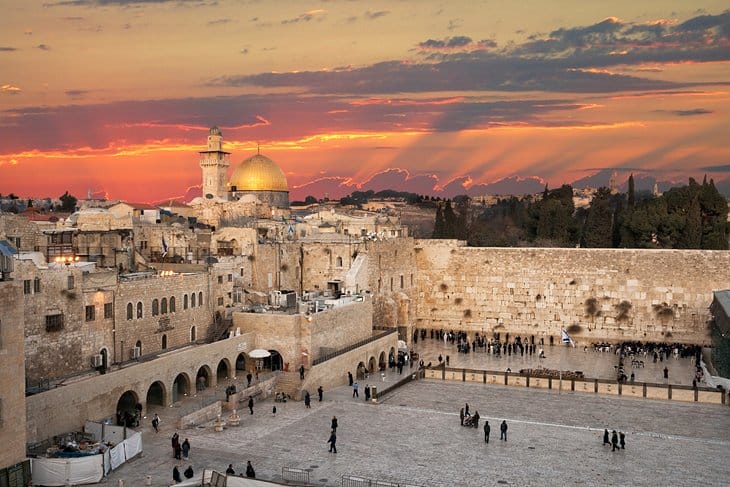
It is no secret that the Jewish people often have a diversity of perspectives on everything. But when it comes to matters of Jewish law, there are many times where consensus emerges between scholars, even across millennia. In the discussions of the permissibility of violating the sacred laws of Sabbath in times of dire need, we find two prominent figures in the realm of Jewish thought, Maimonides and Rabbi Schneur Zalman of Liadi, separated by centuries and distinct backgrounds, in agreement on an extremely timely case:
Maimonides, a medieval scholar, philosopher, and physician who served as the doctor to the Caliph in Egypt, and Rabbi Schneur Zalman of Liadi, the founder of the Chabad-Lubavitch movement founded in Russia that continues to thrive today, both render the same legal decision based on this scenario: when the safety of the Jewish community is at stake and enemies have besieged their cities--particularly border towns--, there is not only a right but a sacred obligation to defend themselves and their fellow countrymen, even if it means violating the sanctity of the Sabbath.
October 7th, 2023 was a Sabbath. Knowing this, Hamas unleashed a brutal wave of terror and violence on Israel, starting with the border towns and moving as far as they could go before Israel was able to mobilize a response to repel this genocidal threat. For more than 60 days since then, Israel has been busy working to free the innocent hostages Hamas has taken, while also operating to eliminate Hamas and its capability to wage terror against Israel and the innocent residents of Gaza.
But around the world, the response to Hamas’s atrocities have been astonishing. While the bodies of Jewish victims were still warm and the remains of others were in the process of being identified by DNA because they were so mutilated, antisemites and critics of Israel were quick to celebrate the massacre as expressions of ‘resistance’ and ‘decolonization’. Others-including in Congress-called for “calm” and a “ceasefire”, seeking to neuter Israel’s ability to retrieve its citizens and defend its sovereignty before it even began.
Yet despite the terrifying and ominous sight of thousands of terror sympathizers marching in cities around the world, chanting genocidal rhetoric and advocating for the erasure of Israel, the United States-both the administration and the citizens of this great nation that empower them-have been overwhelmingly clear eyed about the strategic need and moral obligation to allow Israel to complete its goal of completely wiping out Hamas.
That’s because in a world of alliances and proxy battles, Israel is Western Civilization’s figurative “border town”, where dangerous ideas by extremists are tested before being exported to other Western bastions of freedom around the world. By way of example, Israeli airlines were a frequent target of terror-related hijackings before 9/11, while bus and train bombings were a common tactic of Islamic terrorist suicide bombers in Israel before the 2004 train bombings in Madrid, and the bombing of London’s subway in 2005.
As major world powers jostle and fight for influence in control of areas of the globe far beyond their own borders, Israel is a bulwark of American values and interests in a region dominated by Iran, China, and Russia.
While naive and young Americans call for Israel to be hamstrung and restrained, older and wiser people-as proven by the data- understand the need for the United States to empower a forceful response to Hamas’s aggression.
If Israel allows Hamas to remain intact after the atrocities they perpetrated, the veil of deterrence that keeps the region calm would be completely off, and the implications of that are terrifying:
Hamas’s fellow Iranian proxy, the far more sophisticated Hezbollah terror organization effectively controlling Lebanon, would be empowered to join the war more than the tepid show of support they are offering now. Israel would then be forced to use its air force to handle that exponentially more dangerous threat, drawing Iran into the conflict. The United States would then be obligated to tangibly join the war with manpower and supplies, which would then invite China and Russia into what is now World War III, G-d forbid.
Even if it doesn’t escalate that far, blocking Israel-the United States’ staunchest ally in the Middle East-from doing what it needs to ensure Hamas’ elimination, would send a dangerous message to the United States’ adversaries abroad. It essentially tells dictators like Vladimir Putin, Xi Jinping, and the Mullahs in Iran that America will not stop them from occupying vital allies like Ukraine and Taiwan, and aside from offering tough rhetoric and some arms, they would get away with it.
The world is at a dangerous crossroad, and the United States must empower and support Israel- our ally on the frontlines of our common fight against extremism and terrorism-to ensure the United States’ secure place at the head of the world order and the continuation of our open, free, and secure Western civilization.
Yonatan Hambourger is an Atlanta-based rabbi with Chabad of Rural Georgia teaching the richness of Judaism, while Tzali Reicher is a rabbi and writer currently residing in New York.
November 30, 2023
Thank You, America
By Yonatan Hambourger and Tzali Reicher

On the most spiritually significant day on the Hasidic calendar in the winter of 1986, the Rebbe, Rabbi Menachem Mendel Schneerson, of righteous memory-the most influential rabbi in modern history-surprised the thousands gathered in his New York synagogue by beginning to speak about… Thanksgiving.
Normally known for his commentary on Torah insights or the Jewish perspective on current events, the Rebbe, who spearheaded the global renaissance of world Jewry after the Holocaust, instead praised the uniqueness of the United States. He highlighted how the country's original settlers immediately proclaimed a holiday of thanksgiving to God upon their arrival, expressing gratitude for a secure land and freedom from religious oppression. The Rebbe, who maintained mutually warm and respectful correspondence with the presidents and leaders of his day, also frequently lauded America as a "Medinah shel Chesed" - a nation of kindness, a sanctuary for the Jewish people, and a pillar of support for Israel.
In the centuries since Thanksgiving was first celebrated, it has evolved to a yearly tradition to express our appreciation to God for all the blessings in our lives. There’s a lot to be thankful for: family, health, security, among others, but what is sometimes understated is the privilege of being a citizen of the United States of America.
Living in this country offers countless reasons to be thankful, and this blessing continues to enrich our lives in numerous ways. Through what can only be described as divine providence, we found ourselves born in a land—or made our way to a land—that champions freedom and democracy, something that people born in oppressed nations can only yearn for. Contrary to certain ‘coastal narratives,’ the United States remains a bastion of safety and security, and our right to self-defense and the practice of our faiths without hesitation or fear is written in and protected by our unparalleled Constitution.
But as a rabbi and Jewish citizen of our great nation there is another reason why I’m grateful to and for America: its unwavering support of Israel and America's Jewish citizenry. As the aftermath of the awful Hamas massacre of innocent Israeli civilians on October 7th continues to roil Israel and the Jewish community around the world, America and its citizens have been an overwhelming beacon of support for our most vital ally in the Middle East, and those who it represents.
One of the most tangible forms of support is the robust military aid provided by the United States to Israel, recognizing Israel’s integrity as an ally and its position as the ‘tip of the spear’ against international terrorism. The United States has supplied Israel with weapons, and intelligence, ensuring that it can defend itself against potential aggressors. Diplomatically, the United States has been a staunch advocate for Israel on the world stage, using its influence to protect Israel from biased resolutions and condemnations in morally bankrupt international forums.
While it's true that the President and the U.S. Congress has been exceptional in showing support for Israel amidst pushback from a fringe-but-loud minority, it’s important to note that a country is only as good as its citizens, and our country’s citizens have been so kind and supportive.
The messages and support I’ve personally experienced and been seeing across our great state and nation reaffirms my belief in the morality and righteousness of the everyday kindhearted American. Despite what the media will tell you that America is in decline, the American people are overwhelmingly on the side of stamping out global terrorism in tandem with its allies, projecting U.S. power on the world stage to thwart the global ambitions of our adversaries, reestablishing the vision of our founding fathers to check the spread of neo-fascism and nihilism currently in vogue, and doing what it takes to ensure a safe and prosperous future for all Americans.
In the context of Thanksgiving, the Rebbe's perspective on gratitude takes on a special significance. America, with its support for Israel, embodies the spirit of "Medinah shel Chesed" (a nation of kindness). The United States has consistently shown kindness and support for Israel and the Jewish people, and that has never been taken for granted.
So, during this holiday season, I want to extend my heartfelt thanks to America for its unwavering core principles and support of Israel. The United States of America, by virtue of its people, is a beacon of hope and example for the rest of the world. Thank you, America, for being a true friend to the Jewish people, and long may the great experiment that is the United States of America continue.
Yonatan Hambourger is an Atlanta-based rabbi with Chabad of Rural Georgia teaching the richness of Judaism, while Tzali Reicher is a rabbi and writer currently residing in New York.
November 22, 2023
Israeli Arabs Live Better Than Their Neighbors
By Yonatan Hambourger and Tzali Reicher
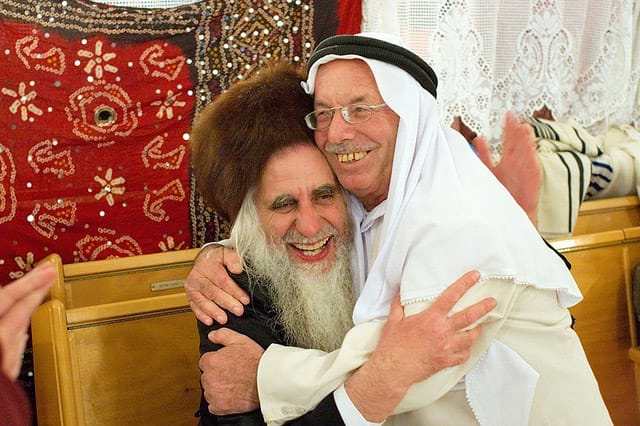
Jews understand what it's like to be mistreated in the countries they live in.
Charting their way through history, no other people has been displaced or expelled as much as the Jewish people. Time and time again, whenever it seemed that Jews had established a stable home where they could integrate and thrive, those foundations were ripped away from them, often through a combination of antisemitic policies and brutal violence.
The feeling of displacement has been baked into the Jewish peoples’ DNA since Biblical times, and is still felt deeply today. As G-d was teaching the Jews how to govern Israel, with the memory of centuries of enslavement in Egypt fresh in the Jewish people’s mind, the Torah commanded them to “not ill-treat a stranger [Gentile] or oppress him, for you were strangers in Egypt”, and understood what it was like to feel unwanted in a foreign land. The Torah commanded the Jews to go to great lengths to make non-Jews feel welcome: not only must they be accommodated—they must be loved and treated as the native-born [Jew]! (Leviticus 19:33–34.)
This philosophy underpins the modern State of Israel’s policy to its Arab citizens, despite what the world and social media tells you about the “discrimination” and “apartheid” Israeli Arabs experience.
As interviews with news outlets sympathetic to the Palestinian cause report on the Israel-Hamas war, Gazans are beginning to speak openly about the barbarity Hamas has unleashed against them in order to retain their iron grip in Gaza. While in Israel, a recent ICI poll found that 70% of Israeli Arabs said they felt solidarity with Israel against Hamas.
This raises a critical question: Why are Arabs in both Gaza and Israel acknowledging the role Hamas played in the destruction of Gaza, while some academics and college students in the Western world rally to support an organization responsible for harming its own citizens and those of its neighbor?
The answer lies in a simple but often overlooked fact: Arabs living in Israel enjoy a higher quality of life, and more civil liberties compared to their counterparts in the region. This reality has been a consistent thread since the State's founding when Israel's first Prime Minister, David Ben-Gurion, urged Arabs to remain in the newly established state, despite the mass expulsion of Jews from Arab states in the aftermath of 1948.
By every available metric, Arabs in Israel lead better lives than those in any of the 22 Arab states in the vicinity. Since 1948, the local Arab population in Israel has grown from 150,000 to a thriving community of 2.1 million citizens in this proud Jewish and democratic state. These Arab citizens have equal rights under the law, are represented by their own political parties serving their interests in government, and even have a Muslim Supreme Court Justice. Moreover, thousands of Arab civil servants contribute to the functioning of the state, and a law mandates that every state-run company must have at least one Arab member on its board of directors. Arabic is an official language of the State of Israel, with signs posted in Hebrew, Arabic, and English.
When you consider the higher levels of education and financial well-being of Arabs in Israel compared to surrounding states, it becomes evident why many choose to express happiness with their lives in Israel. When asked whether they would move to a new Palestinian state, they overwhelmingly respond with a resounding "no." They recognize that the current Palestinian leadership in Gaza, and the West Bank are often corrupt and retain power by terrorizing its own people. Many Gazan and West Bank Arabs are fed up and look with envy upon their brethren who live a better life in Israel, who they erroneously thought were the enemy.
What is life like for Palestinians living in other Arab countries? They mostly face second-class treatment, often confined to decrepit refugee camps without citizenship. A significant number live in Syria and Lebanon as refugees deprived of professional opportunities and government aid. In Jordan, many reside in refugee camps without citizenship, resulting in limited civil rights, poor living conditions, and restricted economic prospects.
Through all these challenges, Israel remains a beacon of stability and prosperity in a volatile region. Many Arabs have expressed a preference for living in Israel because they appreciate the Jewish and Western values it embodies. This preference reflects the positive quality of life experienced by all citizens of Israel, Jewish, Muslim, Christian, and Druze.
Yonatan Hambourger is an Atlanta-based rabbi with Chabad of Rural Georgia teaching the richness of Judaism, while Tzali Reicher is a rabbi and writer currently residing in New York.
November 16, 2023
The Stakes

Anyone who knows their ‘Bible’ and the history of the Jewish people is familiar with an ancient tribe living near the land of Canaan, known as the Amalekites, who earned the title of the number one arch enemy of the Jewish people. They were the first and throughout history, the most consistent nation to attack the Children of Israel. In the Torah, G-d commands the Jewish people to never forget the evil Amalek sought to unleash on them (Deuteronomy 25:17–19) and to completely eradicate them for they would never cease from their attempts to wipe out the Jews.
Please note that while it remains a commandment to never forget the evil of the Amalekites, they assimilated long ago, and G-d’s commandment to eradicate them no longer applies since they no longer exist as a distinct people.
While reeling from fresh reports and images of the atrocious mayhem perpetrated by Hamas against innocent Israeli civilians and foreign nationals, the Prime Minister of Israel, Benjamin Netanyahu invoked the Amalekites vis a vis Hamas. This was not a rallying cry to eradicate innocent Palestinians, rather that the evil known as Hamas must be eliminated.
The relevance of the Amalekite/Hamas analogy is best summed up in a portion of the Torah known as the Midrash which compares the Amalekites to a boiling tub of water which is too hot to enter. One evil person jumped in, and although he was burned, he cooled it for the others.
So too, after G-d performed epic miracles for the Children of Israel, culminating in the splitting of the Reed Sea, no other nation wanted to start up with them for they seemed invincible. But then came the Amalekites to challenge the Jews. Although they were badly beaten, they cooled off the awe of the other nations of the world for them.
What’s fascinating is that the Amalekites had no beef with the Jews, and they also knew they would be badly beaten, yet that didn’t stop them. And herein lie the parallels with Hamas.
Gaza is a territory governed exclusively by Hamas. It is not under Israeli occupation, and it receives billions of dollars a year from various Western and Arab governments. The fact that it doesn’t use the foreign aid to improve the lives of its citizens and rather uses it to stuff their Swiss bank accounts and build elaborate underground cities loaded to the teeth with sophisticated armaments, is on Hamas, not on Israel. Hamas’ real beef is that it will not tolerate any Jews anywhere in the middle east.
It's also interesting to note that Hamas knew well of the overwhelming military might that would be unleashed on it as a result of its terror attack and nevertheless willingly jumped into the boiling hot bath, anyway, just to demystify the invincibility of Israel and the United States.
On October 7th, having been caught by surprise by the unprecedented atrocities unleashed by Hamas, it looked like Israel had lost its ability to maintain deterrence, which is vital in a hostile region of the world where they are surrounded by enemy states. Similarly, when the U.S. evacuated Afghanistan is was also viewed as a loss of U.S. prestige and power which are vital at a time when China, Russia, and Iran are asserting their expansionist intentions.
Is it really a wonder that immediately following Hamas’ aggression, Hezbollah, and the Yemenite Houthis began firing missiles at Israel, while other Iranian proxies started firing missiles at U.S. forces in Iraq, with many injuries and some fatalities?
To recover the edge, Israel must be allowed to fully carry out its mission of eradicating Hamas with full force, without any concern about optics or moral equivocation. By the United States continuing to stand with and to encourage Israel, our U.S. national interests are best served.
This sends a strong and clear signal to our emboldened adversaries in China, Russia, and Iran.
The United States must demonstrate that it will not sit idly by, and that it stands shoulder to shoulder with its allies. We will not let terror and evil fester and spread; we will uproot it completely.
Hamas proved it cannot be allowed to exist by moral and righteous people after what it did on October 7th and armed with the painful memory of horrors committed by past Amalekites and with proud American support, Israel will make sure it won’t.
By Rabbi Yonatan Hambourger and Tzali Reicher
November 9, 2023
When Statistics Confront Morality
By Rabbi Yonatan Hambourger and Tzali Reicher

The images coming out of Gaza have been jarring.
We’re seeing families bereaved, houses destroyed and cities that will never look the same way again, and an unprecedented evacuation of hundreds of thousands of people from a warzone.
Tragically, these events are not unique in a time of war. But what is interesting here is the role of the supposed aggressors and victims in this conflict, and what they’re each doing to make an already difficult situation better or worse.
From the moment Israel was heinously attacked on October 7th--a Jewish holiday--and experienced the largest single day loss of Jewish life since the Holocaust, Hamas--the nominal government of Gaza --knew what response they were bringing upon themselves and their communities.
One of the many secrets to Israel’s continued existence in an unfriendly neighborhood is its perceived military might. That is the only reason the surrounding enemy states have not launched a joint campaign to wipe Israel off the map; because they’ve tried and lost at least three times in 75 years and have made the wise decision to stay away from direct conflict with Israel.
However, Hamas is a terror organization, not a rational government who cares for its citizens. And so, when they were planning the October 7th Massacre, they accounted for what Israel’s response might be and took steps to insulate themselves--the terrorists and leaders living large in Qatar-- at the expense of their supposed constituency.
Hamas employed its modus operandi of hiding and entrenching themselves in urban areas surrounded by civilians, and took hostages to use as a negotiating chip, which they thought would force Israel to back off from an all-out war amid internal and international pressure.
But for Israel to ensure its safety and long-term viability as the only country for Jewish people and liberal democracy in the region of 22 illiberal Arab states, there was only one acceptable response to the barbaric atrocities the horrified world witnessed thanks to Hamas’ livestream butchery: the complete eradication of Hamas’s existence and Gaza’s ability to serve as a launch for terror operations in Israel.
For two weeks, amid impatient waiting, Israel didn’t respond with the all-out invasion of Gaza that the world was expecting. They targeted terror bases by air, while sending texts, flyers, and calls to the residents of northern Gaza. begging them to leave what would soon become an active warzone. The leadership of Hamas brutally forced their own people to stay in harm’s way acting as human shields, because they need pictures of the dead to create the precise tragic images and stats we’re seeing now to wield as tools to force Israel off its mission of eliminating the terrorist threat.
No other country in history has done what Israel does to ensure their enemy’s civilian populations’ safety: two weeks of warnings from multiple platforms, setting up and guarding humanitarian corridors while under heavy fire from Hamas itself, and publicizing the location of specific engagement plans at the risk of their own soldiers.
And yet many across the world and in our media are falling for Hamas’s ruse of ensuring a high death count, in order to hold Israel to an impossibly high standard as it takes on a barbaric enemy with one hand tied behind their back.
Taking the numbers of Hamas’s propagandist Ministry of Health with a grain of salt (as President Joe Biden did, because they have been proven to make up numbers and include terrorists to death counts), it is clear many thousands have died during this war.
But lopsided death counts in war don’t negate morality or the righteousness of the cause of defeating evil when it stares us in the face.
During WWII, there were about 4,200,000 German deaths and about 1,972,000 Japanese deaths, of which many victims were certainly innocent. Imagine if the world called for the war to end on Hitler’s terms, just because 298,000 Americans died, much less than their enemy. Would the world be a better place? Only people who are calling for the eradication of Israel from the (Jordan) river to the (Mediterranean) sea would think so, and no sane people would agree. Lopsided statistics don’t negate morality or the importance for good to defeat evil.
War is tough and brutal and tragic. But Hamas cannot be rewarded for its practice of taking hostages and human shields and be spared from the consequences of its heinous actions just because the world is squeamish and seeing the battle in real time on TikTok and Instagram.
Absolute evil must be destroyed absolutely, and Israel must be encouraged to finish the job with recognition from the United States of the morality of their cause.
I would love to hear your thoughts on this week’s column. Please email me at yonatan@chabadruralgeorgia.com.
Wishing you G-d’s abundant blessings,
Rabbi Yonatan Hambourger
October 25, 2023
G-d on Trial

When he was fifteen years old and a prisoner in Auschwitz, Eli Wiesel watched as three Jewish scholars put G-d on trial for cruelty and betrayal of the Jewish people. They could find no excuse for G-d, no extenuating circumstances, so they found Him guilty. After the verdict, Wiesel said there was silence, and then they all sat down to evening prayers. The boy himself would survive the Holocaust and go on to win the Nobel Prize in Literature and become known as the conscience of the post-holocaust world.
In this story lies the key to navigating the pain of seeming injustices and unfairness in our own lives, in the lives of those we care for, and in the world at large--those times that beg the question, “Why do bad things happen to good people?”
Moses asks this question to G-d, straight up in the book of Exodus (5:22-23), "Why have You done evil to this people? Why have you sent me? For since I came to Pharaoh to speak in Your name, he has done worse to this nation; and you have not saved Your people!" G-d proceeds to assure Moses that it will all turn out well for the Children of Israel, but He doesn’t answer the “why” question.
Whereas some Biblical Commentators suggest that questioning G-d was a failing on Moses’ part, others, including the Lubavitcher Rebbe say Moses’ questioning was an act of faith of the highest order. The Rebbe said that crying out, “Why have You done evil?” can only come from the mouth of a true believer. A non-believer can only shrug his shoulders at the universe.
The lesson for us is that there are times we should confront G-d and ask why there is evil and suffering in the world. But we must understand that the question is more valuable than the answer. For if G-d were to make you understand why innocent people suffer, you might come to terms with it and then be unphased by other people’s pain? After all, it would now make sense.
So, the real answer is to keep asking the question—why bad things happen to good people—but with no expectation of an explanation., Instead redirect your passion to the plight of afflicted people.
Rabbi Israel Baal Shem Tov, founder of the Chassidic movement of Judaism, said there are times when trusting in G-d is forbidden. He explained that while trust is a great virtue in one's own life, relying on it in matters concerning other people's lives is a sin. If you hear about someone in need and just say "G-d will provide," you’re neglecting your responsibility towards your fellow human beings.
But how should we cope if, G-d forbid, the suffering is up close and personal? The Bible dedicates 41 chapters to the archetypal righteous man of suffering, Job, presenting various intriguing explanations only to debunk them all. The ultimate conclusion is that finite humans cannot comprehend the ways of God.
Perhaps we can find solace in a parable related by the late Rabbi Dr. Abraham Twerski about a mother who takes her toddler to the doctor. The doctor prepares to give the child an injection. The kid doesn’t make it easy for the doctor, squirming and trying to get away until the mom has to hold the child down while the doctor administers the injection. All throughout, the kid is screaming and shouting. Not a minute later the child buries his face in mom's arms, desperately seeking solace in her embrace. But why? Wasn’t mom an accomplice when she held him down while the doctor attacked him? Why does this child suddenly find comfort in her arms?
Inherent in every child is the certainty that his or her mother holds the deepest love for them, desiring only their best. Even after brief periods of uncertainty, the profound loving connection between mother and child is promptly restored.
Our Heavenly Father's relationship with us mirrors this dynamic. At times, we might experience fear or frustration and ask why He permits dreadful misfortunes. Nonetheless, we remain aware that His love for us is genuine and unwavering. After all, we’re His children. Like the solace a child finds in his or her mother's embrace, we too find consolation in acknowledging and believing that G-d loves us unconditionally.
I would love to hear your thoughts on this week’s column. Please email me at yonatan@chabadruralgeorgia.com.
Wishing you G-d’s abundant blessings,
Rabbi Yonatan Hambourger
October 19, 2023
This is a War on G-d

As the revelations out of Israel regarding the atrocious butchering of more than 1,300 innocent Jews grow increasingly disturbing, one may rightly ask: Why is this happening to a nation the Bible calls a “light unto the nations?” Over the years, people have offered many complicated answers to this problem, but the truth is simple. Some “human beings” want to snuff out the light so that they can be free to perpetrate evil in the darkness.
Hitler summed up pretty well the fundamental motivation behind antisemitism. He said, “Conscience is a Jewish invention” and that he was “freeing man from the restraints of an intelligence that has taken charge. . .” The Islamic terrorists who murdered whole families last week, who kidnapped, mutilated, and tortured Israelis, were rebelling against these same moral restraints.
Even more so, they were rebelling against the Word of G-d. It’s no coincidence that last week Jews across the world were reading the opening lines of Genesis as part of a scheduled week-by-week reading of the Bible: “In the beginning G-d created the heavens and the earth.”
Rashi, the greatest commentator on the Torah asks, why does the Bible begin this way? He was puzzled because he knew G-d intended Scripture to offer moral guidelines, not a history lesson. Why then start with the story of Creation? His answer was that “if the nations of the world should say to Israel, 'You are robbers, for you conquered by force the lands of the seven nations,' they will reply, 'The entire earth belongs to the Holy One, blessed be He; He created it . . . and gave it to whomever He deemed proper."
In other words, G-d begins the Bible the way He does because He wanted to make clear from the start that He created the world, and it was His to distribute as He liked, and He gave what became the Holy Land to the Jews, the people He chose to be a light unto the nations.
In the twentieth century, first the British in the 1917 Balfour Declaration and then the United Nations in 1947 authorized a Jewish nation in Israel, but it was not in 1948 that Israel was truly founded. It was closer to 1,948 years after the Creation, when Abraham was born, that the Jews got their real charter.
When Abraham arrived in the land of Canaan, the Lord appeared to him and said, “I will assign this land to your offspring.” Ultimately, this is the Jew’s true claim to the Land of Israel, one that is accepted by anyone who accepts the Bible, including billions of Christians, Muslims, and adherents of other religions.
But, again, it’s not about territory. Throughout history, people from the ancient Egyptians to the Amalekites, the Romans, the Crusaders, and the Nazis have attempted to destroy the Jewish people wherever they lived. Even now, Hamas and Hezbollah in Lebanon and the Mullahs in Iran are calling for attacks on Jews not just in Israel, but throughout the world. But every time, the Jewish people have endured and emerged victorious.
What has kept the Jews going? The answer is found in the Haggadah, the Passover prayerbook that contains the lines, "It is this (faith in G-d) that has stood by our ancestors and us. More than one enemy has risen up against us to destroy us. Rather, in every generation they rise against us to annihilate us. The Holy One, blessed be He, however, saves us from their hand."
Hamas doesn’t just want to rid the Middle East of Jews, it doesn’t just want to rid the world of the light of Judaism, but of the light of G-d, Himself. And if you read the accounts of the atrocities they committed, you will see what the result of a world without that light would be.
And don’t be fooled. It’s not just the Jews such people want to eradicate. They want to destroy anyone who stands in the way of their animalistic desires. For them, “in the beginning” means start with the Jews, but it doesn’t end there. Like Hitler’s war, Hamas’s war is not a war against the Jews per se but against Jewish and Christian values, the values upon which Western Culture was built. You can see that in their butchery of the 250 peace-loving young people attending a music festival celebratingidealistic, humanist values, in the Negev desert near Gaza.
How, then, can we, as G-d fearing and loving individuals respond? How can we combat the hate directed against the moral foundation of Western Culture?
Judaism maintains that the purpose of creation is to create a dwelling place for G-d in this physical world. The land of Israel, the place that G-d chose as the Holy Land, is the focal point of that dwelling place. It is the place from which light will grow—or darkness spread. So, we must support the defense of Israel.
But we should also cultivate spiritual light wherever we are by recommitting to G-d’s blueprint, the Bible, by practicing the moral system it lays out for us. Live your life to the fullest, not by indulging the animal within, but by liberating your holiness within. Be kind. Be thoughtful. Create a dwelling place for G-d in your heart and in your home and share the light with others.
Co-authored by Rabbi Yonatan Hambourger and Dr. Thomas P. Balazs
I would love to hear your thoughts on this week’s column. Please email me at yonatan@chabadruralgeorgia.com.
Wishing you G-d’s abundant blessings,
Rabbi Yonatan Hambourger
October 12, 2023
In G-d We Trust

Bill couldn’t sleep. A loan he borrowed from his neighbor was due the next day, and he couldn’t pay it back. His wife also couldn’t sleep—because of all Bill’s tossing and turning. Eventually, she opened the bedroom window and yelled to the neighbor, “Remember the thousand dollars my husband owes you? Well, you’re not getting it tomorrow! Good night!” Smiling, she turned to her husband and said, “Let him worry about it, and let’s get some sleep!”
How can we be sure everything will turn out OK? How can we trust we’ll get what we need when it’s ultimately G-d who decides our fate? And how can we know that He won’t hold our past transgressions against us? After all, G-d knows how many there are.
Traditional religious wisdom advocates serenity. We should remember there’s a Big Boss who has a plan, and whether or not we find G-d's plan agreeable, we should understand that He wants only the best for us. This kind of faith helps us stay composed during trying times. The Torah suggests, however, that we can have a much deeper connection—genuine trust in G-d.
Trust, as opposed to faith, doesn’t just mean we believe everything is “for the best” in some theoretical sense. It means being certain that things will turn out well in a way we can understand and appreciate.
The great Torah Sages tell us, “Think positively, and it will be good.” This doesn't mean we should relax because things will be good. It means if we relax, things will be good! This isn\t just wordplay. They’re telling us we have the power to improve our lives. The key is to have unwavering faith that G-d can and will assist us.
G-d plans His actions according to our mindset. As noted in Psalm 32:10, "For the one who trusts in G-d, kindness shall surround him, and as the prophet Jeremiah says, “Blessed is the man who trusts in the Lord, and the Lord will be his security” (17:7). When you develop deep- rooted trust in G-d, you earn His compassion, making you fit to receive blessings even if you're imperfect. You might be unworthy, but your trust can stir G-d to alter the outcome.
You always possess the capacity to trust G-d. In order to make it concrete, you need to develop your spiritual muscles. Many people strengthen their trust by reading chapter 16 of the Book of Exodus every day. That passage describes how G-d provided daily sustenance to the Children of Israel in the form of manna from Heaven. It’s also helpful to recite from the Book of Psalms every day. The litmus test to determine your progress is the degree to which you experience anxiety when faced with personal challenges.
But even people with complete trust in G-d can be afflicted with pain, suffering, and worse. How can we reconcile this with the premise that trust in G-d will lead to a positive outcome?
Maintaining unwavering trust and embracing challenges with love has been the key to the Jewish people's survival for millennia, against all odds. We do our utmost to move forward confidently and accept unforeseen outcomes with love. And if need be, we confront G-d and ask why he caused such a tragedy. We know we do not know enough to comprehend the answer, but we must believe and care enough to ask the question.
Trust in G-d is not a last resort when all options have been exhausted. It is an internal process that enables us to understand that anything is truly possible for G-d. Trust begins with faith that G-d orchestrates everything, big and small, in the world. But once we take this leap of faith, we can develop something even deeper, a trust that connects us with G-d's power.
Trusting G-d means knowing he is on your side to guide you through challenges so that things will work out better than you could ever imagine.
Experiencing happiness, tranquility, and self-assurance is not merely more pleasurable and efficient than feeling disheartened and anxious. It sustains a positive outlook and faith in G-d that will ultimately enhance your life in concrete ways.
Your responsibility is to remain composed and free from worry, allowing G-d to choose the path to support and care for you.
I would love to hear your thoughts on this week’s column. Please email me at yonatan@chabadruralgeorgia.com.
Wishing you G-d’s abundant blessings,
Rabbi Yonatan Hambourger
October 5, 2023
…and the Pursuit of Happiness

A research project called the 'Nun Study' was conducted from 1930 until the 1990s. Almost 200 women, who were joining a convent, wrote about their lives and thoughts about the future. After seventy years, researchers looked at their entries to find clues to a longer life. They checked factors like intelligence, place of origin, and faith. Only one thing affected how long they lived – their positive attitude. Over 90% of happy nuns lived until 85, but only around a third of unhappy nuns did.
The conclusion emphasizes that striving for happiness can do more than just improve your mood. It holds the power to genuinely extend your life.
To paraphrase Rabbi Shne’ur Zalman of Liadi, one of the greatest Rabbis in history, The battle against negative thoughts is like a wrestling match, where each person tries to knock the other down. If you are lazy and tired, you’ll l lose even if you are strong. The same goes for fighting sadness; you can't win if you're lazy and sad You need to be energetic and happy to overcome those negative feelings.
If you want to be successful at self-mastery in any area of life, being happy gives you a decisive edge. A renowned statement which echoes throughout the Torah is, “joy breaks through barriers.” When a person is happy, his joy fills him with energy and enables him to break through anything that stands in his way. When people are happy, they can overcome weaknesses that would otherwise overwhelm them. Being joyful helps people get past these issues.
How exactly does joy break through barriers?
The Zohar, an important Jewish mystical text, states that what we do affects Heaven. If you are happy, blessings flow from above; if you are sad, blessings can be constrained. That's why Psalm 100:2 tells us to serve G-d with joy, as your happiness can reciprocally trigger Heavenly joy. In short, your attitude can influence G-d's kindness. When you are happy, G-d is happy, and this leads to more blessings than when you are sad.
How can you become a happier person?
Conventional wisdom says that happiness results from having things like good health, intelligence, beauty, good education, a good childhood, and a lot of money. Some people, we are told, receive these blessings and some do not due to random luck.
Judaism completely disagrees. While it acknowledges that certain situations can make life easier, it also emphasizes that some people live in perfect conditions but lack happiness. The famous psychiatrist and author of Man’s Search for Meaning Viktor Frankl reported of a young woman in a concentration camp who told him she “knew that she would die in the next few days. But. . .was cheerful in spite of this knowledge. ‘I am grateful that fate has hit me so hard,’ she told [him]. ‘In my former life I was spoiled and did not take spiritual accomplishments seriously.’”
In the final analysis, said Frankl, “Everything can be taken from a man but one thing: the last of the human freedoms—to choose one’s attitude in any given set of circumstances, to choose one’s own way…when we are no longer able to change a situation, we are challenged to change ourselves.”
Yes, "The pursuit of happiness" may be challenging and elusive. However, the Torah's expectation that we should "serve G-d with joy" is not an unrealistic demand; it's an empowering truth about human nature. Take children as an example – they are free to be happy because they are not yet self-aware. As they mature and become more self-conscious, they also become more self-absorbed. Everyone has hardships, deficiencies, and frustrations, providing ample reasons to be sad or upset. However, a child isn't bothered by what they lack; thus, they experience a sense of wholeness. The child's lack of self-consciousness allows them to enjoy life and be happy.
The more one focuses on personal happiness, the more elusive it becomes. As soon as one forgets about what he is missing and refocuses on what he is needed for—the good he can do for others rather than the good he can get for himself—joy returns, and happiness prevails!
I would love to hear your thoughts on this week’s column. Please email me at yonatan@chabadruralgeorgia.com.
Wishing you G-d’s abundant blessings,
Rabbi Yonatan Hambourger
September 27, 2023
Our Responsibility
Fifteen-year-old Davey came home from school and found his mother in bed. He asked if she was sick. "As a matter of fact, I don’t feel too well,” she said.
Well,” Davey replied, “don’t worry a bit about dinner, Mom. I’ll be happy to carry you down to the stove.”
Responsibility for others is a core principle in any moral society. Two prominent figures in human history, Noah, and Abraham, each faced a test in this department. The way in which these two virtuous men reacted offers valuable lessons to those who fear that society is in a state of moral decline and feel powerless to stem the tide. By way of example, A Gallup Poll conducted last year cites that 78% of respondents say that morals are getting worse in the U.S. Further, respondents cite that “lack of consideration for others” is the top problem by over a 2:1 margin.
The Torah (Bible) tells us that ten generations after Adam, G-d said to Noah, “I’ve decided to put an end to humanity, for the earth is filled with robbery because of them, and I am destroying them from the earth. Make for yourself an ark…”
Noah did everything just as G-d commanded him” (Genesis 6:13-14, 22). With not a body of water in sight, Noah spent the next 120 years building a 440-foot-long “super ark.” Why did G-d give him a task that took so long? One of His purposes was to elicit curiosity from passersby. When they would ask Noah about his ark, he would warn them that G-d planned to destroy the world, but there was still time to repent. Notably, no one took him up on his offer.
Although Noah diligently followed G-d’s directions to the letter, he focused on the safety of himself and his loved ones. If the rest of humanity was beyond redemption, he thought he needn’t take any responsibility for them. But G-d actually wanted Noah to intercede on their behalf, which could explain why the prophet Isaiah alludes to the deluge as "the waters of Noah." Noah’s lack of interest in his fellow men resulted in him sharing some responsibility for their demise.
Fast forward ten generations to the time of Abraham. G-d told him, “The outcry from Sodom and Gomorrah is so great and their sin so grievous that I will go down and see if what they have done is as bad as the outcry that has reached me. If it is, I will destroy them…” (Genesis 18:20-21). Unlike Noah, Abraham who felt a deep personal responsibility for others, says to G-d, “Will you even destroy the righteous with the wicked? What if there are fifty righteous people in the city; will you destroy it and not spare the place for the sake of the fifty righteous people who are in it?” He then goes on to negotiate with the Almighty getting G-d to agree that if even ten righteous people could be found, he would spare the entire population. We might see Abraham here as pleading for the lives of the righteous, but in fact, he was also hoping to save the wicked along with them.
Sodom and Gomorrah's inhabitants were notoriously cruel. Hostility toward visitors, sexual assault, murder, theft, adultery, idolatry, power abuses were considered normal behavior. Nonetheless, Abraham harbored a deep sense of personal responsibility for these individuals, and his persistent attempts, though unsuccessful, were ultimately rewarded by G-d. As stated in Genesis 18:18-19, “all nations on earth will be blessed through him” for following the path of G-d and doing charity and justice.”
While both Noah and Abraham stand as acclaimed figures in world history, Abraham’s approach was favored by G-d. Considering this contrast, what, then, might be an effective approach today to help the growing number of people who suffer from loneliness, family issues, psychological struggles, addiction, and so forth. Who couldn’t benefit from your compassion, support, and moral clarity at a time in history where morality is becoming untethered from the one G-d, and is fast becoming relative concept based on convenience or social agreement?
Carrying on Abraham’s legacy is possible for everyone by serving as an ambassador of light. Seize the opportunity to suspend judgements and connect with each person you encounter based on the fact that they are also created in G-d’s image and thus deserve your causeless love and kindness. So, if Davey’s mother ever takes ill again, hopefully Davey reads this column and will serve his mom breakfast in bed!
I would love to hear your thoughts on this week’s column. Please email me at yonatan@chabadruralgeorgia.com.
Wishing you G-d’s abundant blessings,
Rabbi Yonatan Hambourger
September 20, 2023
Go to Yourself!
Abraham, the first patriarch of the Torah (Bible) and founder of ethical monotheism, was the progenitor of the Jewish people and is revered by Jews, Christians, and Muslims alike. Interestingly, Abraham’s father was not only an idolater but was actually in the idol-making business and trained his son in the worship of the many gods they sold. But at a young age, Abraham grew skeptical of all the deities and deduced that there must be a singular force that runs through and transcends all existence., at great risk of life and limb, he fought t against the paganism of his time, standing up against his upbringing and education.
A pivotal event occurred when Abraham was 75, which not only redefined his own journey but continues to shape our lives today. G-d called upon Abraham to "Go forth to yourself, from your land, from your birthplace, and from your father's house to a land that I will show you” (Genesis 12:1). The Sages of the Talmud explained that "your land" refers to one's natural desires, "your birthplace" to the influence of the surrounding culture, and "your father's home" to the mindset and behaviors shaped within one's family.
To make Avraham into a great nation (Israel) and bless him (12:2), G-d wanted Avraham to “go forth to yourself.” The phrase "go forth to yourself" implies that even if someone has reached their highest potential through self-work, only G-d can connect them with their essence – a place beyond education, culture, and family.
By conventional standards, anyone who has developed their potential and acquired vast knowledge through discipline and hard work is considered to have attained the ultimate level in human achievement. However, even at this elevated level, one remains limited – influenced by their education, upbringing, family environment, ego, and prejudices.
There exists a higher realm beyond these limitations – a spark of Divinity at the core of the human soul, breathed into man when he was created in G-d's image. G-d's message beckons not only to leave behind one's nature, habits, and rational self but also to transcend these boundaries. Through His guidance given to Abraham, G-d invites each individual to experience that which supersedes all limits and definitions: Himself.
To begin this journey toward Divine connection, one must first "go to yourself." Moving away from the finite self allows for the discovery of the "you" that only G-d can reveal – the "you" that is one with Him.
I would love to hear your thoughts on this week’s column. Please email me at yonatan@chabadruralgeorgia.com.
Wishing you G-d’s abundant blessings,
Rabbi Yonatan Hambourger
September 13, 2023
Rebuilding Humanity
Who doesn’t know the story of Noah, the famous ark builder? We read in the book of Genesis (6:9-11:32) how humanity had sunk into an abyss of moral depravity.
The one notable exception was Noah (“perfect in his generations” 6:9) who was tasked by G-d to build an ark to save his family as well as every species of animal from the coming deluge.
What you may not know is that even after G-d decided to flood the Earth, he gave everyone ample opportunity to change their ways and live. The sages tell us that even after the downpour started people could have transformed the destructive storms into rains of blessing, but they remained hard-hearted.
When they left the ark, Noah and his family were charged with re-building humanity based on G-d’s original plan for Adam and Eve. They were provided with a set of ethical laws for all human society, for all time. These laws established universal codes of decency including the acceptance of and accountability to a single Creator who cares about what human beings are doing; the establishment of the family framework; the enforcement of law and order; and prohibitions against murder, theft, and cruelty. These G-d given laws are compatible with every belief system and religion and provide a blueprint for how all of humanity can dwell together as brothers.
The Sages of the Torah point out that there are destructive rains in every generation representing various anti-spiritual influences. These rains may appear harmless, even beneficial, at first but ultimately can destroy the very fabric of society. This is why each person, each family, each community must make sure that their ark is watertight, by embracing G-d’s wisdom as established in these laws.
But it’s not enough to keep darkness out. Each one must encourage the light within to shine outward and transform the surrounding darkness into G-dly light. All that’s missing is to embrace the common ground found in G-d’s message of humanity’s purpose.
I would love to hear your thoughts on this week’s column. Please email me at yonatan@chabadruralgeogia.com.
Wishing you G-d’s abundant blessings,
Rabbi Yonatan Hambourger
September 6, 2023
Push Forward
The Jewish New Year (Rosh Hashanah) begins next month on the evening of Friday, September 15th. While it is a Jewish holiday, it actually commemorates the anniversary of the creation of the first man and woman, Adam, and Eve. So, this is a good time to examine one’s thoughts, speech, and actions over the past year to see if any of them fall short of one’s best self, and then to resolve to do better in the coming year. It’s hard to imagine anyone who wouldn’t benefit from such an exercise.
The process of self-examination and the commitment to do better is known in Hebrew as “Teshuvah,” a concept similar to “Repentance”. The word actually means “return,” as in returning to the right path. The prototype for repentance occurs in the aftermath of Cain’s brutal slaying of his brother Abel and can be found in the Book of Genesis (4:3-17).
While not a hero by any stretch of the imagination, Cain did ultimately acknowledge to G-d, “My sin is too great to bear”. Second, Cain was sent by G-d to “dwell in the land of the wanderers”. The sages of the Torah teach that solitude generates a spirit of humility within a person, aiding him in his soul-searching. Third, Cain understood he could never undo his mistake and could not bring his brother back to life, but that didn’t deter him. Rather, he used his sin as an impetus to build an entire city, rather than wallow in depression. He knew he would have to actively repent for the rest of his life, but at least he could repair in some measure the world that he damaged.
Sin breeds depression, and depression breeds sin. Nobody is exempt from this cycle. The question is what to do after the sin.
Initially, Cain played dumb with G-d by asking the infamous question, “Am I my brother’s keeper”? But once he admitted his guilt and set out to repent, he was able to successfully dedicate his life to something greater than himself. So even if one is responsible for terrible mistakes and disastrous consequences, one must strive to make a positive difference in the world. The lesson from Cain is that no matter what happened, or because of what happened, one must push forward.
Repentance in Judaism is focused on restoring one’s connection and relationship with the Almighty. It is not based on the mere desire for self-improvement, but on finding the best way to serve the Creator. Committing oneself to a relationship with G-d will ensure that the resolution to be a servant of G-d will endure.
I would love to hear your thoughts on this week’s column. Please email me at yonatan@chabadruralgeogia.com.
Wishing you G-d’s abundant blessings,
Rabbi Yonatan Hambourger
August 30, 2023
Adam's Legacy
In perhaps the best-known story from the book of Genesis (2:25-3:24) G-d banishes Adam and Eve from the Garden of Eden for eating from “the Tree of Knowledge of Good and Evil” against His direct command. Prior to that G-d had provided Adam & Eve with everything they needed and desired, with no effort required on their part. His only condition was simply to not eat the fruit from one particular tree.
What is less well known is that the “sin” occurred at 3 o’clock in the afternoon on Friday, and Adam knew that if he held out another three hours until the Sabbath, he would have been allowed to eat from the Tree of Knowledge. And as for Adam himself, he was the perfect human specimen; his soul was blown into his nostrils by none other than the Divine Creator. So here was human perfection with a very minimal instruction from G-d to carry out, for a mere three hours. Come on! Couldn’t he control his desires? Something bigger is going on here.
Adam made a fully informed decision to trade paradise for toil, struggle, and certain death, not just for himself and his family, but also for all of humanity. There must be more here than meets the eye!
Let’s go back to the beginning, so to speak.
G-d created a perfect world, inhabited by perfect people, surrounded by pure goodness. Man was also given a choice to make. Did Adam want a perfect life given to him and all of his descendants, or did he want to choose a life earned by the “sweat of his brow” while challenged relentlessly by darkness, lust, and envy?
Maybe Adam knew what he was doing, and he chose wisely.
People endowed with immortality without any challenges could never realize their full potential. Instead, thanks to Adam, humanity was gifted with a mission to bring heaven down to earth by taking responsibility each for his own corner of the world and transforming G-d’s creation back into a garden. Yes, there are thorns and thistles, struggle, and pain, along the way but also the satisfaction of one’s own efforts on his way to accomplishing ultimate good. Only with the coming of the Messianic era (speedily in our days) when the world reverts back to the perfection of the Garden of Eden, will we fully appreciate the fruits of our labor. Most definitely a more challenging path, but also incomparably more rewarding.
Wishing you G-d’s abundant blessings,
Rabbi Yonatan Hambourger
August 23, 2023
Subdue the Earth!
“Pray for the welfare of the government,” a great Jewish sage once said, “for were it not for the fear it inspires, every man would swallow his neighbor alive.” An established justice system is the bedrock of any civilized society. Without it, the world would be chaotic and dangerous.
This week’s Torah (Bible) portion, (Deuteronomy, Chapter 16:18-20:9), includes the commandment, “You shall appoint judges and officials…in all the settlements that the Lord your G-d is giving you, and they shall govern the people with due justice.”
Thus, for example, in a case concerning theft, the court accepts the testimony of the accused if he confesses. In fact, the Talmud (the primary source of Jewish law) says, “admission by a litigant is equivalent to a hundred witnesses.”
Yet, in a case of capital punishment, a confession cannot be accepted by the court. In fact, two witnesses are required to testify against the accused. So, in the case of one’s possessions, a confession is accepted. But in the case of one’s life, a confession is not accepted. Why is there a distinction?
Unlike material possessions, human bodies are Divine property, on loan to man. The book of Genesis (1:27) states, “And G-d Created man in His image, in the image of G-d.”
“In His image” means people have the intelligence, self-awareness, and the capacity to choose to pursue good or its opposite. Genesis (1:28) goes on to say that G-d gifted these qualities to mankind to “subdue the earth.” According to the Grand Rabbi of Lubavitch that means people should respect the holiness of their bodies and bring holiness to all their material possessions as well, in fact to the whole world. Then everyone will perceive that all existence, in all its details, expresses the glory of G-d.
The teaching that humans are created in the Divine Image is a call to action to subdue the world, rather than be subdued by it, not to accept personal challenges as fate, but rather to meet those circumstances and overcome them. Bear in mind, of course, that while humans are created in His image, only G-d is all-powerful. You may encounter circumstances you cannot control; but you can still exercise freedom to choose your perspective and how you react to challenges. That’s what it means to be created in God’s image.
Wishing you G-d’s abundant blessings,
Rabbi Yonatan Hambourger
August 16, 2023
ACHIEVING PERSONAL LIBERATION
From the time of Moses, Jewish people around the world have been reading a portion from the Torah (Bible) each week, in sync. We complete the cycle each year and immediately return to the beginning. This week’s portion is from the book of Deuteronomy 11:26-16:17.
There, in Moses’ farewell address to the ancient Israelites, he reminds them that “since you were commanded to go out of the land of Egypt in haste, there was no opportunity for your dough to rise.” When the moment of liberation struck, the Children of Israel didn’t lose a moment, “not even the wink of an eye!” Why did they have to move so quickly?
The Egyptians had just barely survived G-d’s wrath in the form of ten devastating plagues, culminating in the death of all their firstborn. They were happy to see the Children of Israel go. The danger was not that the Egyptians might change their minds. Rather, the it was that some of the ancient Israelites might change their minds, having become accustomed to the Egyptian way of life.
In fact, the sages of the Talmud say that had they missed that auspicious moment, the opportunity for liberation would have been forever lost.
So too, we must guard against complacency. Exodus from Egypt was not a one-time historical event. Rather, the root of the word “Egypt” in Hebrew shares the root of the word for “bondage.” In our everyday lives, we must each contend with our own “inner Egypt,” which is one reason why the Jewish people reference the Exodus in their daily prayers.
Our task is to break free from anything that causes us to be subservient to the ‘animal’ within or our materialistic environment without. We should seize the opportunity to achieve personal liberation and to help others do the same. This means freeing ourselves from undesirable and self-limiting thoughts, feelings, and actions. For one person that could mean making peace with an estranged loved one. For another, it could mean resisting an unhealthy urge. For someone else it could mean celebrating instead of feeling jealous of another’s good fortune.
Let’s not be satisfied with the status quo nor give into the pressure to conform to the prevalent culture around us. At the same time, let us be sensitive to those around us who are enveloped by a state of darkness. One cannot hit darkness with a stick. It’s much more effective to simply turn on the light. Remember and remind that the darkest moment of night is just before the dawn!
Wishing you G-d’s abundant blessings,
Rabbi Yonatan Hambourger
